7-Day and 10-Day Israel Itinerary: The Perfect Adventure

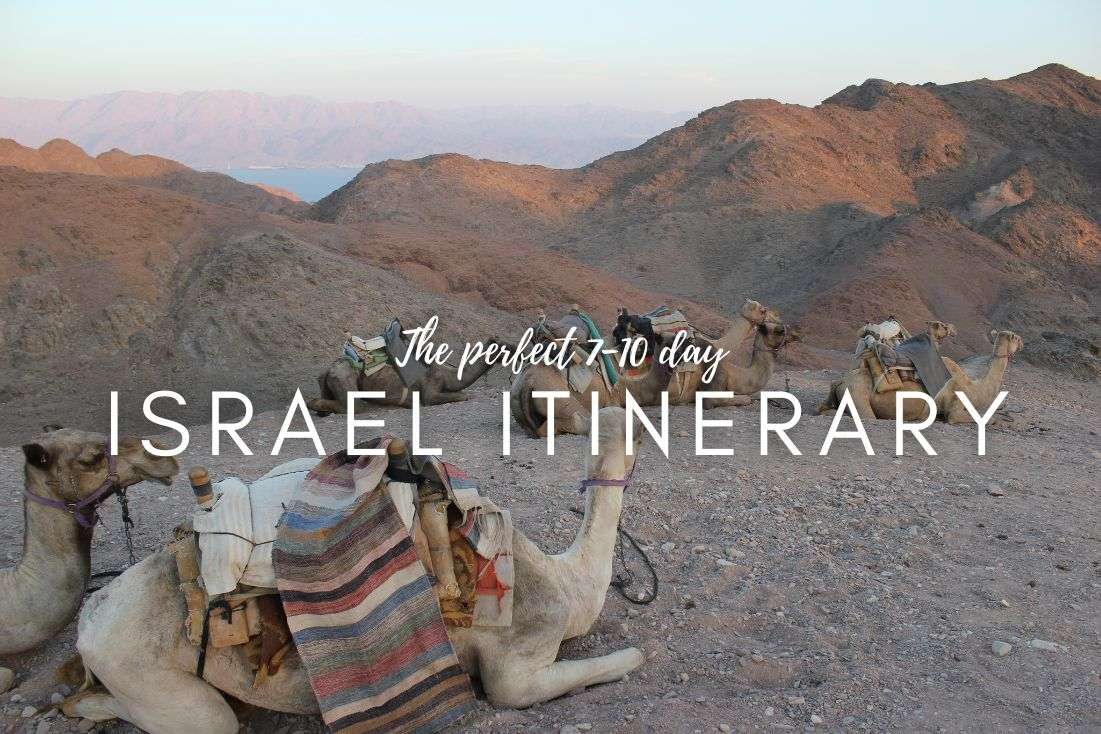
Ohh Israel, the land of ancient history, stunning natural beauty, affable Jews, and, let's say, less-than-cheery Arabs. It's a place of cozy winters and summers that feel like living inside a sauna.
Honestly, my expectations for Israel were as low as the Dead Sea because my past experiences with Jews were, let's just say, unremarkable. But surprise, surprise, they're actually pretty charming in their homeland! And a massive perk? This country is so tiny; you're never driving more than a hop, skip, and a jump (or 1-2 hours) from one marvel to the next.
But, let's talk about the elephant in the room: the military presence. In Jerusalem, it's like a weird game of "Spot the Assault Rifle"—they're everywhere. That said, Israel also boasts fantastic hotels, restaurants, and, oh boy, the infrastructure! But brace yourselves, because your wallet will feel lighter here. "I’m looking for a more budget-friendly vacation than South Africa" my friend asked. "Sure, how about Israel?" I joked. Spoiler alert: She wasn't thrilled when she saw the prices.
So, if you're like me, wondering what to do with your cash (haha), Israel's your go-to holiday spot. I've crafted a snazzy 7-day Israel itinerary for you, and for the true ballers, a deluxe 10-day version. Day-by-day plans with practical info like opening hours, ticket prices, top-notch accommodation, and more. If planning isn’t your cup of tea, I’ve done all the heavy lifting for you. I know, I know, you're forever grateful.
Top tips for your Israeli adventure
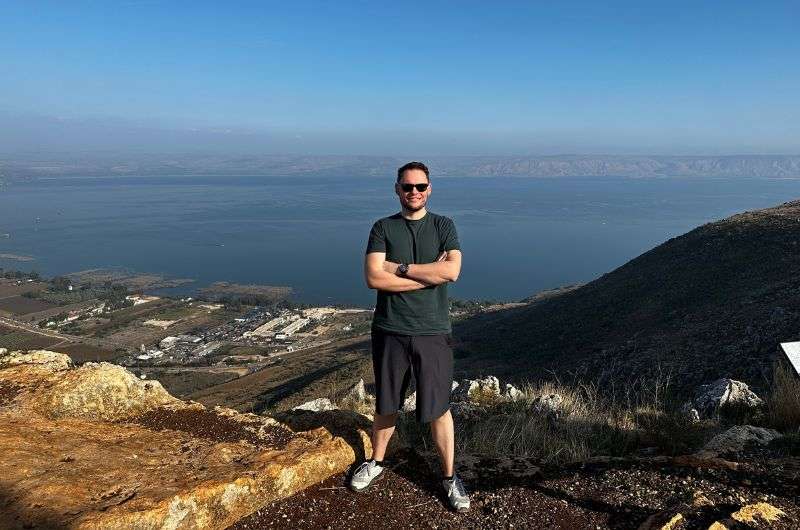
I’ve travelled around Israel and here’s my recommended itinerary!
1. Renting a car: It’ll cost you a pretty shekel, but the longer you rent, the cheaper it gets. Israel’s roads are top-notch, but their drivers? A wild bunch. They'll scratch your car and drive off faster than you can say "Shalom!"
2. Best time to visit: Winter is your best bet. Fewer crowds, tolerable weather, and prices that won't make you weep. Summer is only good if you fancy melting by the Mediterranean.
3. Lost in translation? Whip out Google Translator. Despite everyone speaking English, you'll find a lot of Hebrew around, which is as decipherable as ancient hieroglyphs. You’ll feel it at the least expected times, like at gas stations.
4. Parking then eating: Sounds backward, but trust me. Snag a parking spot first, then hunt for food. In Israel, parking can be trickier than convincing a camel to pass through the eye of a needle.
5. Stay connected with Airalo: Got a dual-sim phone? Grab an e-sim and save yourself the hassle with local telecom companies.
6. Food: Israel’s food is in my top 3 globally, hands down. But, be prepared to dish out more than USD 250 for dinner. Your taste buds will thank you, but your wallet? Read more about Israeli food.
How many days in Israel is enough?
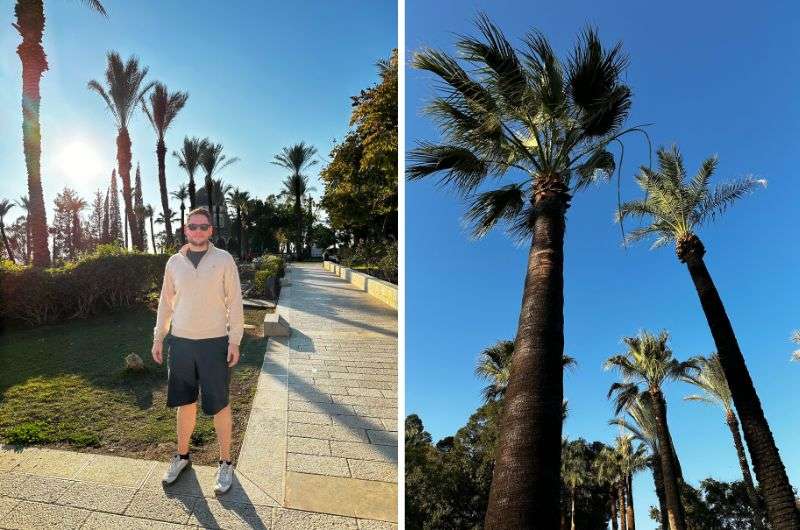
7 or 10 days, Israel is definitely one of my favorite countries I’ve ever traveled to!
Is 7 days enough for Israel? That's the million-shekel question. Sure, you can see a lot in a week, but it'll be like running a marathon in flip-flops. Jerusalem alone deserves a solid three days—check out my Jerusalem itinerary so you don't miss a beat.
In a nutshell, if you can't take a long vacation, a week in Israel is still worth it. But, for the best experience, aim for 10 days. That's the sweet spot.
The best Israel itinerary for 7 days
This is the route of your 7day Israel itinerary (see it on Google maps)
Here’s how to plan the best week in Israel:
Day 0: Arrival in Tel Aviv (afternoon promenade)
Day 1: Drive to the Sea of Galilee, Tzipori NP, Mount of Beatitudes (sleep Ein Gev)
Day 2: Drive around the Sea of Galilee, Beit She'an (sleep Ein Gev)
Day 3: Drive to Rosh Hanikra, Akko (sleep Tel Aviv)
If you plan to explore Israel for more days, check the 10-day itinerary, because from now on the upcoming days are different.
Day 4: Haifa, Caesarea (sleep Tel Aviv)
Day 5: Dead Sea, Masada, Ein bokek oasa (sleep Tel Aviv)
Day 6: Jerusalem (sleep in Jerusalem)
Day 7: Jerusalem, departure
And here’s how to plan the best 10 days in Israel:
Day 1: Arrival in Tel Aviv (afternoon promenade)
Day 2: Drive to the Sea of Galilee, Tzipori NP, Mount of Beatitudes (sleep Ein Gev)
Day 3: Drive around the Sea of Galilee, Bet Shean (sleep Ein Gev)
Day 4: Drive to Rosh Hanikra, Akko (sleep Tel Aviv)
Day 5: Micpe Ramon + Avdat NP (sleep Tel Aviv)
Day 6: Haifa, Caesarea (sleep Tel Aviv)
Day 7: Dead Sea, Masada, Ein bokek oasa (sleep Tel Aviv)
Day 8: Jerusalem (sleep in Jerusalem)
Day 9: Museum day: Yad Vashem & Israel Museum
Day 10: Jerusalem, departure
Day 0 of Israel itinerary: Arrival in Tel Aviv
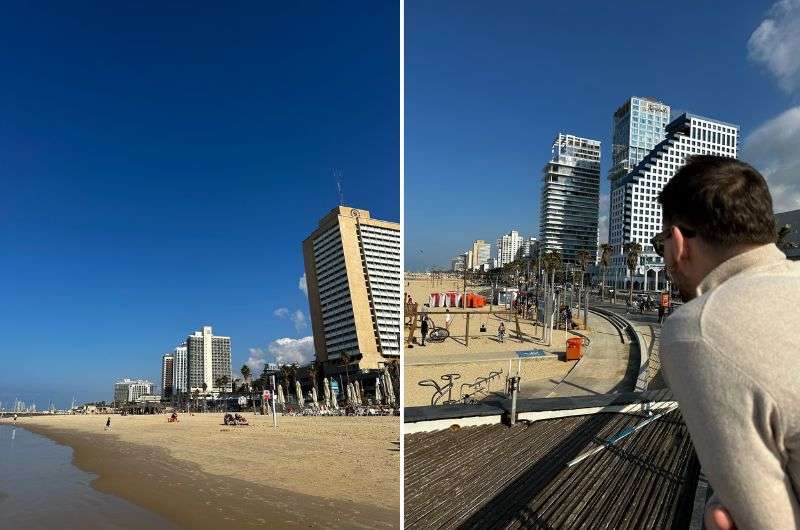
After a long trip to Israel, I had just enough energy for a walk on Tel Aviv beach
Main sites visited on day 0: Tel Aviv promenade in the afternoon
Restaurant tips: Whiskey Bar & Museum, George & John
Hotel recommendations: Crowne Plaza Tel Aviv City Center
Further reading: A Day in Tel Aviv | The 8 Best Day Trips from Tel Aviv
Surprised by a Day 0? Let me explain—it's not cheating, but more like getting acclimated after the journey to get to Israel. I don’t know where you’re traveling from, but from the Czech Republic it’s like 3,000 km to Israel. While the young me would've hit the ground running, the current me (that isn’t 20 anymore, or even 25) prioritizes comfort and a good night’s rest. So, Day 0 is for settling in.
Day 0 Stop 1: Tel Aviv promenade
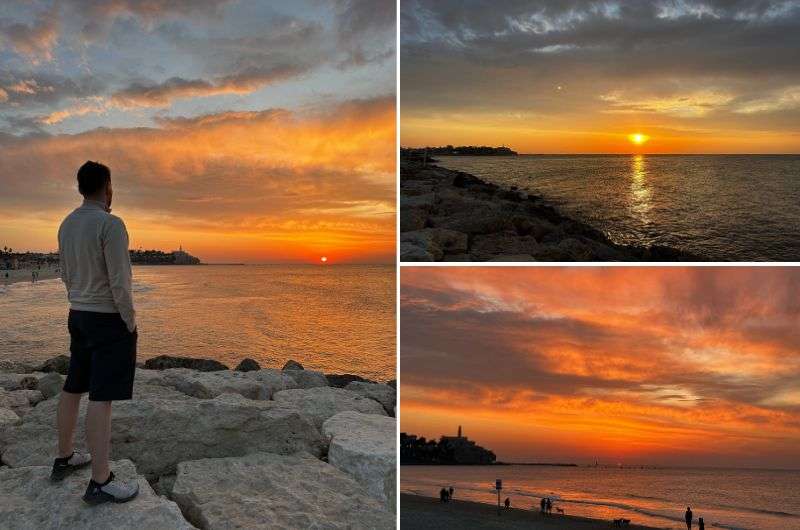
Evening walk at the Tel Aviv promenade is a great start of the Israel travel!
I didn’t expect much from Tel Aviv, a city younger than a century-old wine. But its promenade, Tayelet, won me over. If you're not a fan of strolls, this might change your mind.
Starting from Tel Aviv Port, the promenade stretches about 4 km (2.48 mi) through areas known as the Shlomo Lahat Promenade and Charles Clore Park, leading to the port of Old Jaffa. Jaffa is an ancient port city considered to be one of the oldest cities in the world. So, unlike Tel Aviv, this place definitely has a lot to offer from a historical perspective. If you have any amount of time in Tel Aviv, you just have to visit the promenade and the beach, it's sooo nice.
Tel Aviv isn't just about promenades. It's got a modern, almost American vibe with skyscrapers, lush parks, and top-notch restaurants. Actually, some of the best meals I had were here in Tel Aviv.
Day 0 Stop 2: Time to eat and sleep
As I teased earlier, Tel Aviv is a food paradise. I highly recommend the Whiskey Bar & Museum—great service, but watch your bill for any sneaky extras (could’ve been by accident, but you never know). And yes, the whiskey is as good as it gets (my beverage of choice).
For sleep, I chose Crowne Plaza and would do it again. It's well-located with excellent parking. The receptionists were always helpful, rooms spacious, and—now pay close attention—they have a pillow menu describing each pillow's features and ideal sleeper—a genius idea every hotel should adopt. And their bathrobe? Absolutely top-notch.
Day 1 of Israel itinerary: Drive to the Sea of Galilee
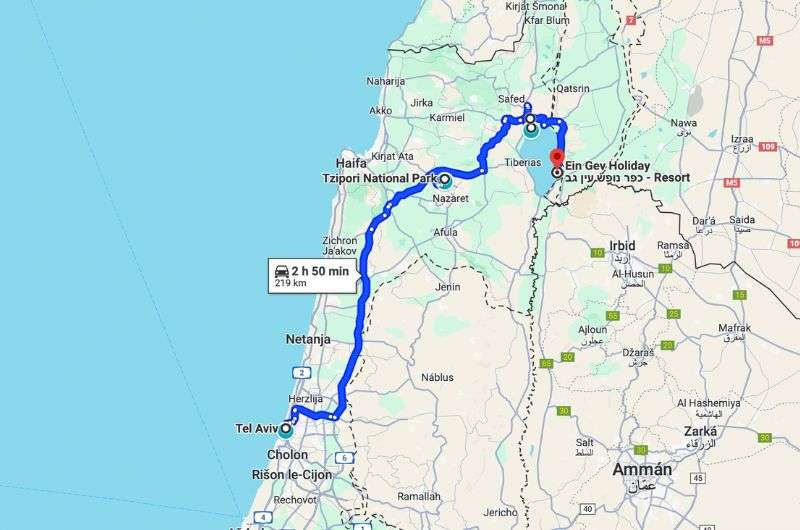
Driving from Tel Aviv to the Sea of Galilee with stop in Tzipori National Park and Mount of Beatitudes
Main sites visited on day 1: Tzipori National Park, Mount of Beatitudes, The Sea of Galilee
Restaurant tips: Moshbutz | Decks Restaurant
Hotel recommendations: Ein Gev Holiday Resort | UG Boutique | Alta Galilea Boutique (further away from the Sea of Galilee, but worth it!)
Further reading: The 8 Best Day Trips from Tel Aviv | 14 Best Places in Israel | Street food in Israel
On your first day, you'll head out from Tel Aviv to the Sea of Galilee. The car journey, even with a few stops along the way, takes about 2 hours and 50 minutes. For us passionate travelers, that's not much of a distance at all. One great thing about Israel, being the 150th largest country in the world, is that you won't spend your youth in the car. The compact size of the country ensures your travel times are always reasonable.
Day 1 Stop 1: Tzipori National Park
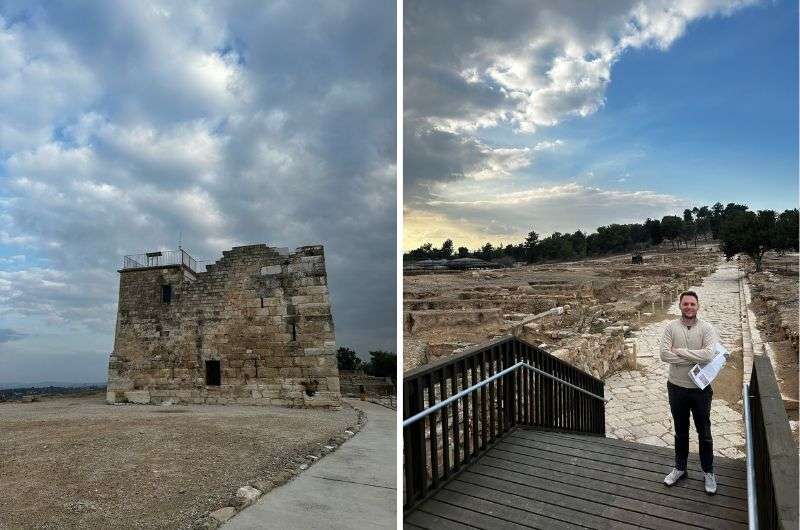
Ruins of the former city Tzipori
Distance from central Tel Aviv: 114 km/70.83 mi, 1 hour 16 min drive
Time spent here: 1,5 hours
If you've been following my travel blog for a while, you'll know I'm a history buff. That's why Tzipori National Park is a must-see in my 7-day Israel itinerary. Originally a significant city during Roman and Byzantine times, it served as the capital of the Galilee region. It avoided destruction by staying neutral during Jewish revolts, preserving its rich archaeological treasures.
I was fond of the ruins, offering splendid views of the surroundings. We breezed through in 1.5 hours, taking our time, despite reading that you need 3–4 hours... not sure what else there was to see to stretch the visit for that long. It’s a big place, but there are not that many places where you can stop and admire. Highlights? Definitely the House of Dionysus.
Tip: Space out your cars when parking. Tourists can be... unpredictable. We left with a seriously scratched car side. Thank God for full coverage.
- Tzipori National Park official website
- Open daily 8 am–5 pm (summer hours), 8 am–4 pm (winter hours)
- Tickets cost ILS 28 (USD 7.52)
Day 1 Stop 2: Mount of Beatitudes
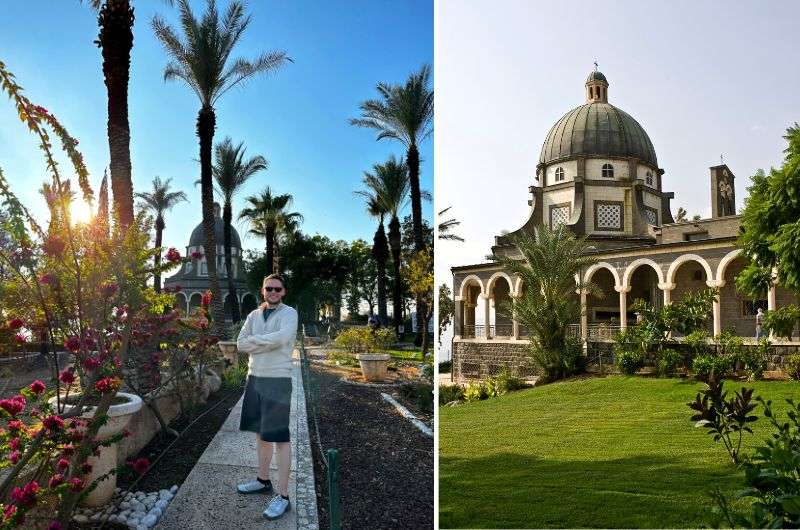
Mount of Beatitudes is beautiful!
Distance from previous stop: 58.4 km/36.28 mi, 42 min drive
Time spent here: 1–2 hours
Next, we very much enjoyed the Mount of Beatitudes (and you will too).
People believe that this is where Jesus delivered his sermons, including the famous teachings known as the Beatitudes (hence the name). Mountain... it sounds like you will have to climb the hill, but no worries. You will just drive here and park the car. And what to do here? You can visit the church of the Beatitudes and delight in the views. Imagine yourself perched atop this hill and looking out over an enormous area of land. What can you see? Modern structures in Magdala, and Lake Capernaum where Jesus supposedly walked on water (don’t worry, you’ll get to visit it soon, too). Though, the lake seemed pretty shallow to me—not that impressive, Jesus. The area's also great for its mountains, restaurants, sun, and pleasant 25°C (77°F) weather. Truly special.
Day 1 Stop 3: Sea of Galilee and surrounding holy sites
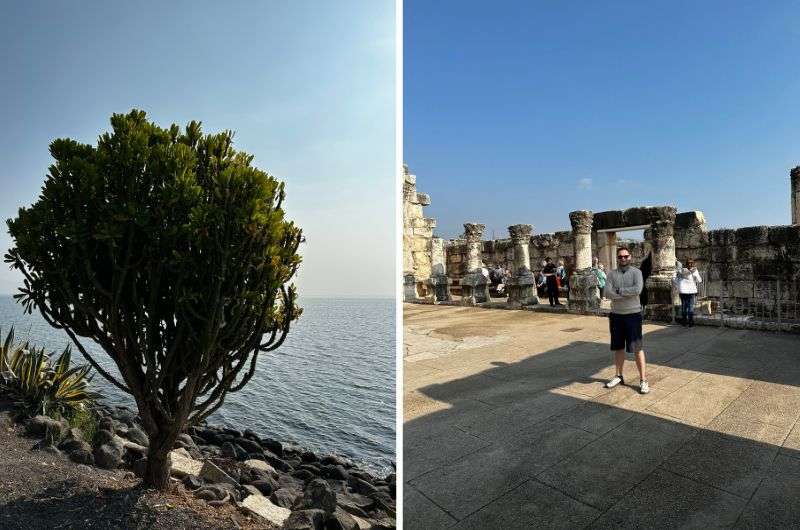
The “Sea” of Galilee
Distance from previous stop: 11 km/6.8 mi, 13 min drive
Time spent here: Today 2 hours, but what about tomorrow
Ladies and gentlemen, welcome to the one and only Sea of Galilee, a place of natural beauty and, well, interesting holy sites where miracles (never) happened. It's technically not a sea, and the second-lowest point on Earth after the nearby Dead Sea. It serves as a water reserve for all of Israel and Jordan. It’s a place with great weather during Christmas and fun(ny) holy sites where you can witness the surreal scene of folks getting baptized in the Jordan River. You gotta love such a place!
You will spend 3 days in the area, which is plenty of time to explore. For today, gear up for a hike in Arbel National Park and Natural Reserve, offering one of Israel's nicest views towards Jordan Valley, the Dead Sea, the Golan Heights, Mount Hermon, and Galilee. It took us about an hour and it is a nice walk–nothing too hard. At the beginning of the hike, there is also a parking spot, so you have no excuses to get on the road.
- Hike length: 856 m/2 808 feet
- Hike duration: 1 hours
- Difficulty: Easy peasy
- Trailhead: Google Maps link to trailhead
- Arbel National Park and Nature Reserve official website
- Open daily 8 am–5 pm (summer hours), 8 am–4 pm (winter hours)
- Tickets cost ILS 22 (USD 5.9)
Good to know: Just so you know, in this part of Israel, they're still into that retro cash-only vibe. After a facepalm moment at Eagle's Nest due to my empty pockets, I wised up and came loaded with shekels. And hey, I've even got 26 more Israel-specific tips up my sleeve, just in case.
We stayed at the Ein Gev Holiday Resort near the Sea of Galilee. Think decent value for money, considering it's Israel. This place isn't just lakeside; it's like stepping into a retro bubble with surprisingly swift internet—a rarity around here. The staff? Super friendly. And get this—you're practically dozing off in a spot sandwiched between Syria and Israel. The resort itself is part of the Ein Gev kibbutz, which adds a dash of 'living like the locals.'

In Moshbutz Restaurant they offer this cute little pitcher of beer
Hungry after the drive? Moshbutz Restaurant won't disappoint. Their steak and kebab are worth a try (no, I didn't get both for myself). Located by a traditional kibbutz shop, it offers a stunning view of the Sea of Galilee. The steak might set you back ISL 160 (USD 44), but for the flavor and view combo, it’s a small price to pay.
Day 2 of Israel itinerary: Loop around the Sea of Galilee towards Beit She’an
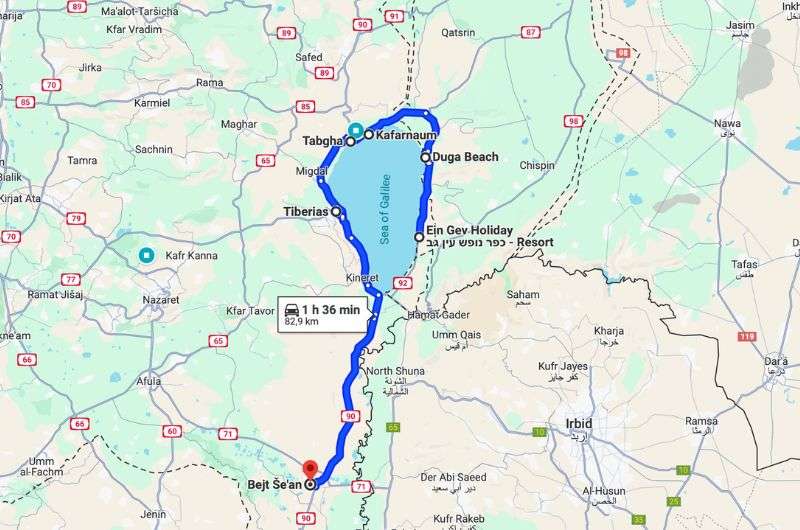
Driving from Ein Gev around the Sea of Galilee + Beit She’an.
Main sites visited on day 2: Ein Gev, Tiberias, Tabgha, Capernaum, Duga Beach, Beit She’an
Restaurant tips: Magdalena Restaurant | Moshbutz | Decks Restaurant
Hotel recommendations: Ein Gev Holiday Resort | UG Boutique | Alta Galilea Boutique (further away from the Sea of Galilee, but worth it!)
Further reading: 14 Best Places in Israel | Sacred Wonders
Day 2 offers an amazing loop around the Sea of Galilee, then heads to Beit She’an. While some might suggest walking or biking the 53 km (32.9 mi) around the Sea of Galilee, I prefer not to spend half my week in Israel circling one lake. Besides, you've got a car! So, turn up your favorite tunes and let's hit the road!
Day 2 Stop 1: Ein Gev
Time spent here: 2 hours
No need to venture far if you took my advice and stayed at Ein Gev Holiday Resort. Start your morning with a stroll through this unique kibbutz village, a rare blend of agricultural cooperation and communal living. Not something you’ll see every day, so keep your eyes peeled.
Day 2 Stop 2: Duga Beach
Distance from previous stop: 15.3 km/6.4 mi, 12 min drive
Time spent here: 2–3 hours (you could spend an entire day, but not in our case, we have too many other stops that we’d miss out on and also it was winter when we were there, so swimming was not an option. Yes, the outisde temperature was 25°C (77°F), but the water was frikin cold.)
I didn't want your entire second day to be a biblical marathon following in Jesus' footsteps (and honestly, neither did I fancy that). So, our second stop is Duga Beach. This recently renovated beach is currently touted as the best beach at the Sea of Galilee. And it's genuinely nice—with well-kept lawns, a camping area, and playgrounds. Unfortunately, the fact that it's a great beach isn't exactly a well-kept secret, so expect a crowd, especially on weekends.
Day 2, Stop 3: Capernaum
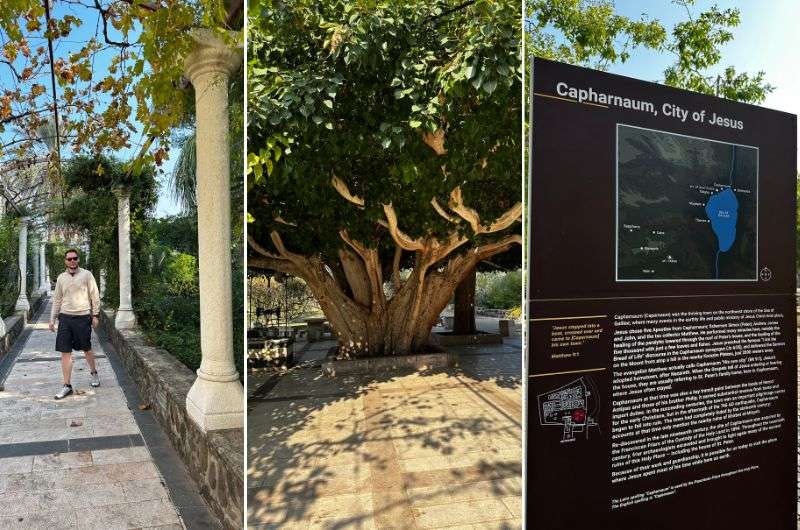
This place is full of miracles!
Distance: 10.3 km/9.5 mi, 17 min drive
Time spent here: 1–2 hours
Capernaum, once home to Jesus, where he performed numerous miracles, is a must-see. For Christians, it's perhaps the most significant site around the Sea of Galilee.
Capernaum was a hometown of Jesus' first apostles Peter, Andrew, James, Matthew, and John. All that remains now are ruins, but they're fascinating, and probably my favorite holy site in all of Israel. Walking these paths, where Jesus gained his fame and spread his teachings, is something extraordinary.
Once you try to imagine Jesus walking on water at the nearby lake, it is worth visiting the well-known Capernaum Synagogue, where Jesus imparted his teachings. You will need a little imagination while exploring these well-preserved ruins. It was an impressive structure, built of large, white limestone blocks, which stood out among the other buildings.
And of course, you should also visit Peter's house, or at least what remains of it. Originally, it was the house of Saint Peter. Later, people attributed religious significance to the building, and additional floors and rooms were added to it. In the 5th century, a church was even built on the earlier remains. Nearby the ruins of the house, you'll find the St. Peter's Memorial.
Make sure to have cash on hand, cards won’t get you very far in these parts!
Day 2, Stop 4: Tabgha
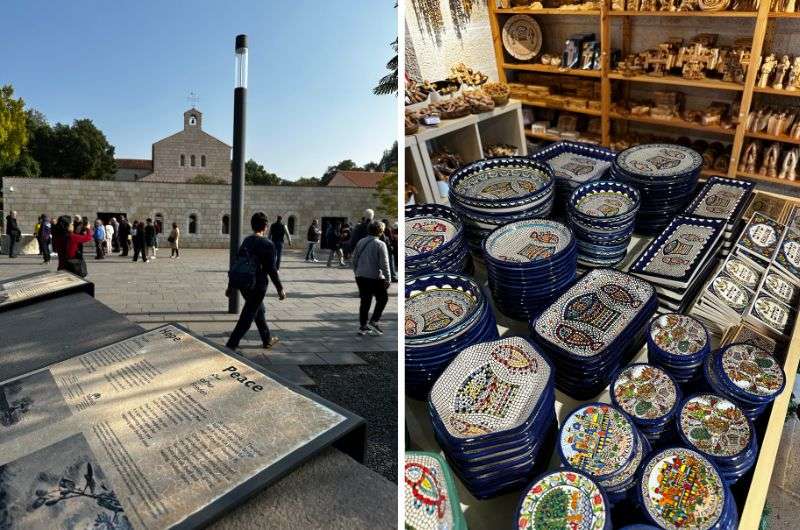
Tabgha is one of my favorite Holy Sites in Israel
Distance: 3 km/1.9 mi, 5 min drive
Time spent here: 1 hour
Still craving biblical wonders? Visit Tabgha, also known as Tabhka or Tabiga, Tabgha, or as I like to call it, the Christian miracle hub on the northwestern shore of the Sea of Galilee. It is another place where Jesus supposedly performed miracles—this time, the culinary kind! Something about multiplying loaves and fishes to feed the hungry.
Do you want to know more about this miracle? Then visit the Church of the Multiplication of the Loaves and Fishes, which commemorates the miracle when from a measly five loaves of bread and two fish, Jesus managed to feed 5,000 people. In the church, you will find plenty of mosaics depicting precisely this miracle.
Another place to visit. Stop by the Church of the Primacy of Saint Peter, located nearby. This church marks the traditional spot where Jesus reinstated Peter as the chief apostle.
Without delving into too much extra details here, those interested in sacred sites should definitely explore further: Sacred Wonders: Discover 13 Unforgettable Holy Sites in Israel
Day 2, Stop 5: Tiberias
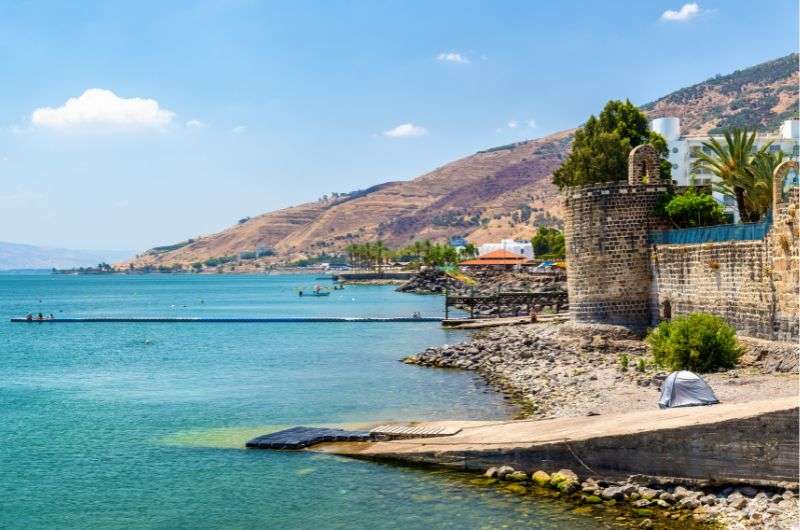
Distance: 14.4 km/8.9 mi, 19 min drive
Time spent here: 2–3 hours (including lunch)
Tiberias, rich in history and religious significance like many Israeli cities, underwent a makeover in the 1970s. Picture a mishmash of concrete abruptly meeting the historical Church of Saint Peter. The real highlight? The array of fantastic restaurants, like Magdalena, perfect for a lunch stop.
Day 2, Stop 6: Beit She'an
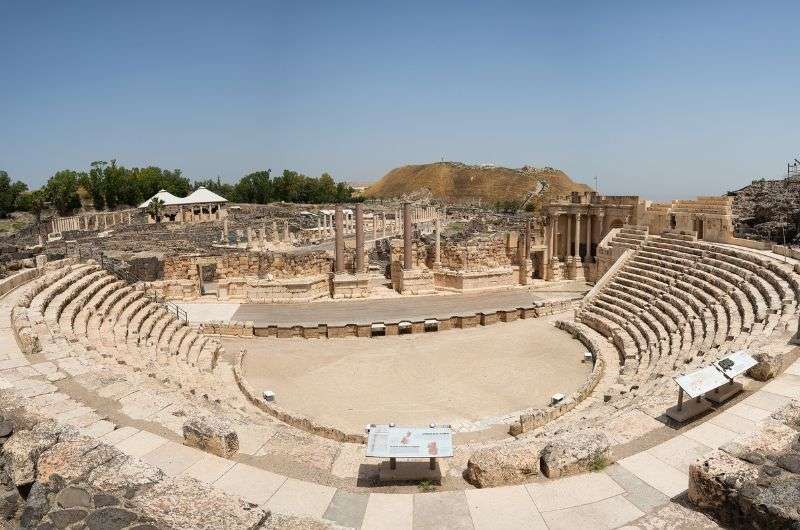
An archeological gem—Beit She’an
Distance: 40 km/24.6 mi, 41 min drive
Time spent here: 3 hours
And today’s climac is Beit She'an—an archaeological marvel in the Jordan Valley. Be ready to be blown away by a city that has witnessed the rise and fall of empires like an ancient game of dominos, but still standing proud and tall. Well, not exactly, it's mostly ruins now, but you get the point!
Roman settlers formerly called Beit She'an home, according to some of the site's oldest artifacts. Determining if Romans resided someplace, is a pretty simple task. Not many civilizations constructed as exquisite theaters as the ancient Romans. Their passion for theatrics was evident at Beit She'an as well. This Roman theater is a spectacle, with a stage large enough to accommodate the most epic plays and tragedies. You'll also find a significant amount of work from Byzantine periods, which is even more remarkable, next to the Roman remnants.
Today, Beit She'an proudly displays its historical treasures for all to see. And another fun fact for you: only 1/10 of the city has been excavated! After you see how huge this place is, you’ll find that hard to believe.
Phew, that seems like more than enough excitement for one day. We decided to spend another night at Ein Gev Holiday Resort, because why change when it's this good? (Don't worry, we're switching spots tomorrow.)
- Bet Shean Official Website
- Open daily 8 am–5 pm (summer hours), 8 am–4 pm (winter hours)
- Tickets cost ILS 28 (USD 7.52)
Day 3 of Israel itinerary: Rosh Hanikra & Akko
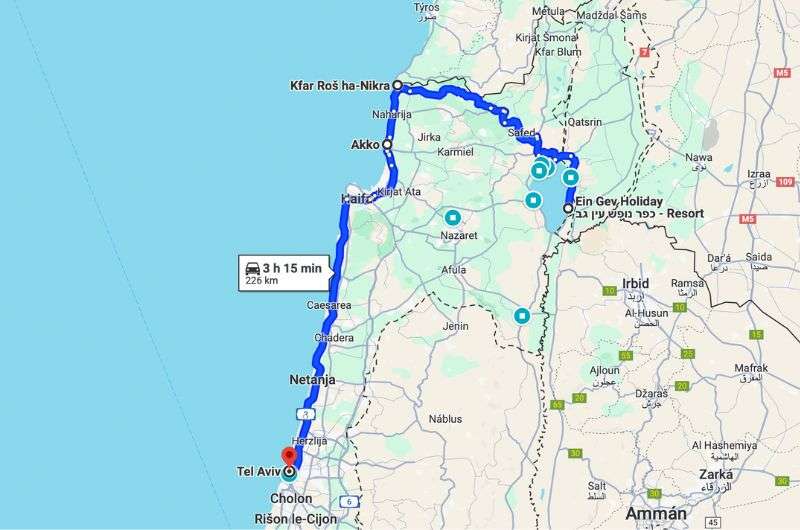
Driving from Ein Gev to Rosh Hanikra and Akko
Main sites visited on day 3: Rosh Hanikra, Akko (The Knights' Halls, The Old City of Akko)
Restaurant tips: HaTsuk Restaurant | Restaurant Doniana
Hotel recommendations: Melisende | Crowne Plaza Tel Aviv City Center
Further reading: Unveiling the Top 10 Things to Do in Akko | The 8 Best Day Trips from Tel Aviv | 14 Best Places in Israel
Brace yourselves for a bit more driving today as we go from the eastern edges to the western Mediterranean coast and then down to Tel Aviv.
Day 3, Stop 1: Rosh Hanikra
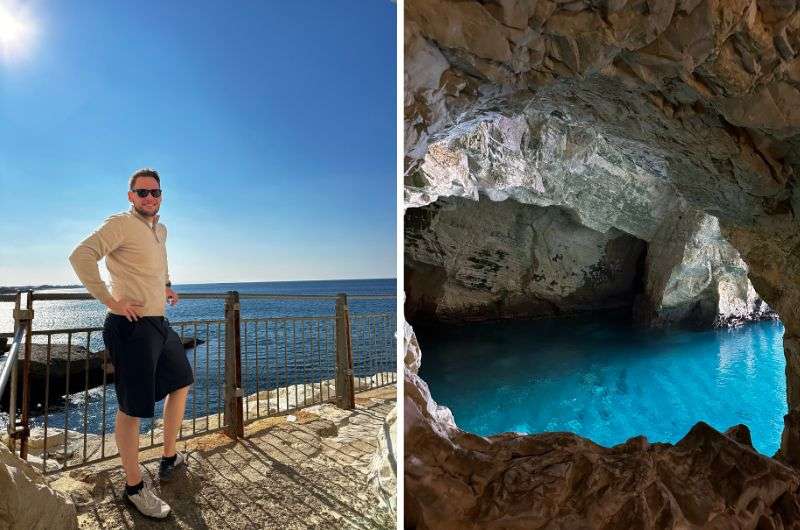
This dashing boy survived the steep cable car ride and still managed to take a beautiful picture of himself and Rosh Hanikra cave
Distance from Ein Gev: 94.5 km/58.7 mi, 1 hour 20 min drive
Time spent here:
Get ready for a bit of adrenaline—well, only if you’re scared of heights. The best way to explore this natural wonder near the Lebanese border is by cable car. Rosh HaNikra is slightly off the beaten path, and I probably wouldn't have stumbled upon it without some prior research. Luckily for you, I did the legwork, so not only can you see my photo from this place (lucky you), but I also get to recommend this hidden gem.
Now listen, I really want you to understand how special this place is. I went to see it twice—that's how amazing it is! I rarely go see something twice, so that has to mean something. During the ride enjoy the gorgeous views of the white-rocky coastline and the azure sea.
After you get out of the cable car, you have to explore the best part: the grottoes, a series of sea caves carved out by the waves over thousands of years. They are filled with crystal-clear water, and the colors and shapes of the rocks are going to entertain you for a while. I would say about an hour, even if you walk through the caves along a designated path at a sloth's pace and listen to the unusual noises the sea is making.
Fun Fact: It's said to be the steepest cable car in Israel. Not exactly what you want to hear about a cable car, right? Well, too late now. Good luck and try not to panic!
- Rosh HaNikra Official Website
- Google Maps link for parking
- Open Sunday to Thursday 9 am–5 pm, Friday 9 am–4 pm
- Tickets cost ILS 47 (USD 13), available online
Day 3, Stop 2: Akko
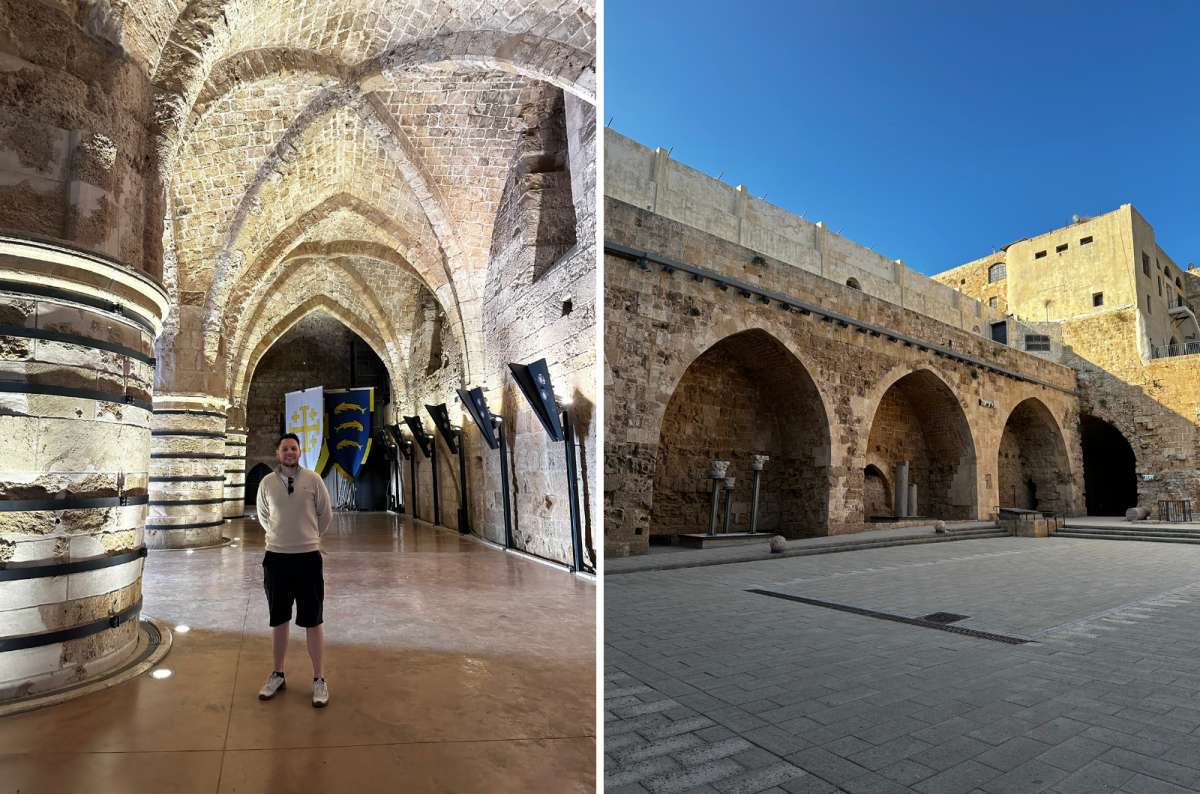
I liked Knights' Hall the best in Akko
Distance from previous stop: 18 km/11.2 mi, 23 min drive
Time spent here: 1 afternoon (though 1 day would be ideal)
Oh, Akko, how I miss you. As a self-proclaimed biggest Roman history nerd and lover of Middle Eastern antiquity, Akko was a perfect match for me, and I bet it will be for you too. What it doesn’t lack in historical significance makes up in the cultural richness and beauty. I call this a win-win.
But now come some hard decisions. Since you don't have a full day in Akko, my meticulously curated top 10 things to do in Akko list is useless. So, I'll pick the absolute best of the best for you, and you'll just have to trust my impeccable taste.
Surprisingly, the best place in Akko is a cellar. But not just any random cellar—The Knights' Halls. This is a collection of chambers, including the grand Dining Hall. Step into this grand space with its lofty ceiling and impressive acoustics, and let your imagination run wild. Legend has it that the knights would gather here to hold important meetings.
- Citadel and Knight Halls Official Website
- Open daily Saturday to Thursday 9 am–6 pm (5 pm in winter), Friday 9 am–4 pm
- Tickets: The Akko Ticket for 49 ILS (13 USD) covers the Knights Halls, Hammam, Templars Tunnel, and Treasures in the Wall Museum
The Old City of Akko will make you feel as though you've stepped through a time warp and returned hundreds of years in the past (a stark contrast to cementy Tiberias). The best examples of Crusader-era architecture in existence can be found in this ancient harbor city, which is recognized as a UNESCO World Heritage site.
Ideal for a stroll after nearly two hours in the car. As you walk the historic alleys, you can imagine living during the Crusades—at least, that's what I did.
The city is surrounded by well-preserved walls that once served as a protective barrier. Walking along the walls provides panoramic views of the city and the sea. Well, the walls seemed pretty impressive to me, and even more so as they saw some fighting throughout the ages. Even though they were built by the Turks.
The central part is very compact and very walkable, though be ready to get lost as it's like a maze and sometimes you might get into a messy dirt hole as the central part is mainly occupied by Arabs. You definitely shouldn't miss Al-Jazzar Mosque. This mosque is an architectural marvel with its distinctive dome and minaret.
Another important historical site is the Citadel of Akko, also called the Pisan Fortress. Over the ages, it has fulfilled several functions, including that of a prison during the Ottoman era. A tip from me is Khan Al-Umdan. It is an Ottoman-era caravanserai, built in the 18th century. It served as a center for merchants and their goods during the Ottoman Empire.
There is much more to see, for example, the Hospitaller Fortress or Maritime Museum, but it is really up to you. It depends on what you like, and that’s one thing I don’t know.
Reminder: You still need to get to Tel Aviv today, about an hour and a half's drive (115 km/71.5 mi). So, I wouldn't linger too long if I were you.
Day 4 of Israel itinerary: Haifa and Caesarea
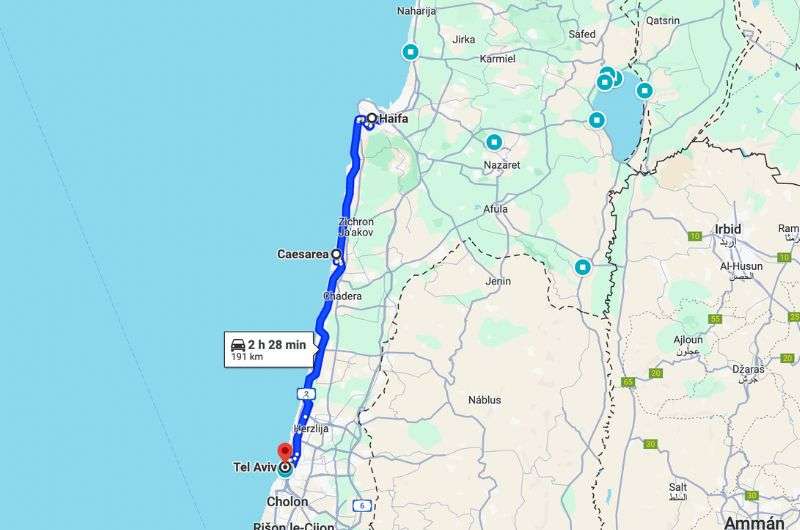
Driving to Caesarea and Haifa to discover other amazing places in Israel
Main sites visited on day 4: Haifa and Caesarea
Restaurant tips: Ein ElWadi Restaurant | Port Cafe
Hotel recommendation: The Norman Tel Aviv
Further reading: The 8 Best Day Trips from Tel Aviv | 14 Best Places in Israel
Day 4, Stop 1: Haifa
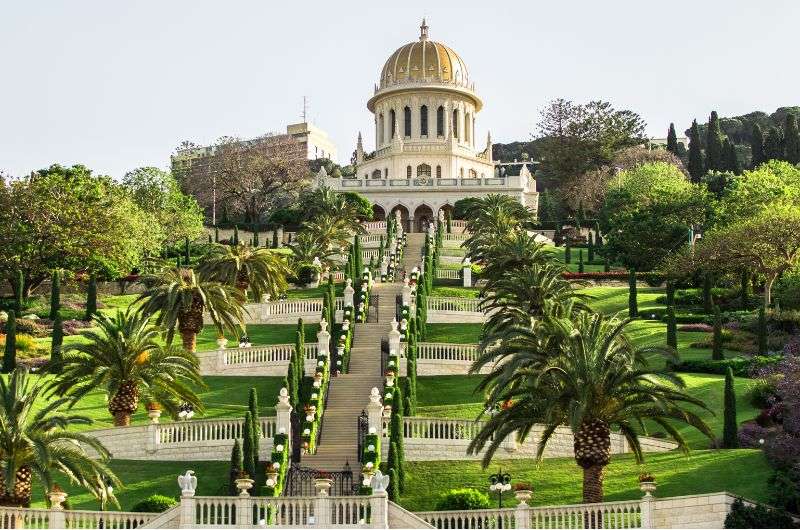
Oh Haifa...I loved it!
Distance from Tel Aviv: 93 km/ 58 miles, 1 hour 7 min drive
Time spent there: 5 hours
Haifa gets the bronze medal when it comes to largest cities in Israel. Located north of Tel Aviv, Jaifa is an under-the-radar destination that you have to visit.
Among its highlights are the Baha'i Gardens, a must-see with 19 terraced gardens connected by stone pathways. Despite Haifa's quieter tourist scene, the gardens attract around half a million visitors annually. You get spectacular views from the individual gardens, so don’t just stare at the flowers. (It’s open daily from 9 am to 5 pm.)
After sweating your way up, visit the golden dome, a rest place for the prophet of the Baha'i faith. This golden dome sports nine walls, symbolizing the nine major world religions. Since you've already huffed and puffed your way up here, you might as well pop inside. Trust me, it's worth it. Inside, you're greeted by an array of mosaics and ornate decorative elements—a feast for the eyes, especially if you appreciate a bit of bling in your holy places.
Next, head to German Colony Plaza, right under the gardens. This popular Haifa neighborhood is steeped in history, with original houses from the time the first Germans arrived during the Templar movement. Full of cafes, restaurants, and shops, don't forget to spin the wheels of the Israeli economy by making a purchase. For a beautiful lunch by the coast, try Ein ElWadi Restaurant. Interestingly, you'll find the prettiest Christmas decorations in Haifa in these parts (if you visit over the holidays).
Above Haifa looms Stella Maris Monastery, one of the world's oldest, dating back to 1291. Visit it after the German Colony Plaza. Inside, find depictions of Elijah and the fiery chariot he ascended to heaven in. Even if you're not spiritual, the monastery is worth visiting for the stunning views.
Day 4, Stop 2: Caesarea
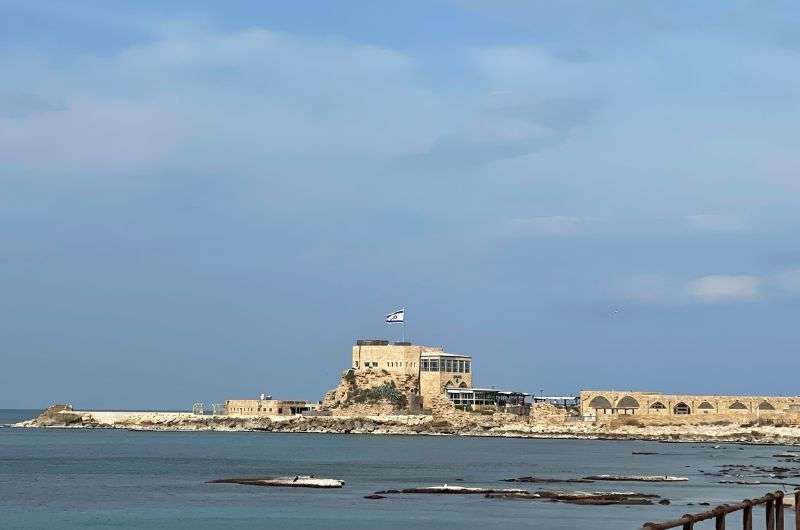
The Herod’s palace in Caesarea
Distance from previous stop: 42 km/ 26 mil, 34 min drive
Time spent there: 4 hours
Caesarea was a significant ancient city nestled between Haifa and Tel Aviv. Named during Herod the Great's reign, who revamped it to honor the emperor, Caesarea became the capital of Roman Judea, playing a role in biblical events.
Herod built a palace in the sea here, of which only the foundations remain. Along with the palace ruins, there's an amphitheater that, for me, is one of the best archeological finds. The city is also known for its aqueduct network, with several still standing.
I was super excited about Caesarea but, to be honest, it was a bit underwhelming compared to how I hyped it up in my mind. It's a ruin, and they haven't really maximized its potential. Ironically, my favorite part turned out to be the Philippi cave, swarming with hundreds of bats. Way cooler than some old stones on the shore!
But make your own opinion. Explore this ancient city, and maybe you'll be thrilled. There are plenty of things to see. You can admire, for example, the Amphitheater built for 5,000 people (where concerts are currently held), a Hippodrome that accommodated up to 20,000 spectators, excavations of palaces, and nearby, a preserved section of an Aqueduct that brought water from the mountains into the city.
See a map of Caesarea on Google Maps
Where to crash tonight? Well, sleep wherever you fancy and see if I care... but we headed back to Tel Aviv, specifically to the Crowne Plaza. With tomorrow's journey taking you in a completely different direction than today, it seemed like a strategic choice.
Day 5 of Israel itinerary: Masada National Park, Dead Sea and Ein Bokek
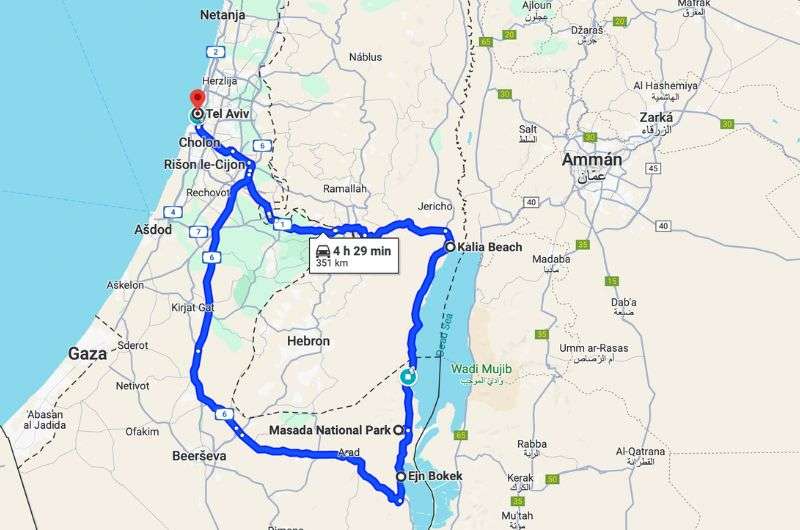
Exploring Kalia Beach, Masada National Park and Ein Bokek Beach in Israel
Main sites visited on day 5: Masada National Park, Kalia Beach, Ein Bokek Beach
Restaurant tips: Ein Bokek Restaurant | Lowest Bar in the World | Night Kitchen
Hotel recommendations: Beer Garden Hotel Elegant | Central Beach Hotel
Further reading: The 8 Best Day Trips from Tel Aviv | 14 Best Places in Israel
Day 5, stop 1: Masada National Park
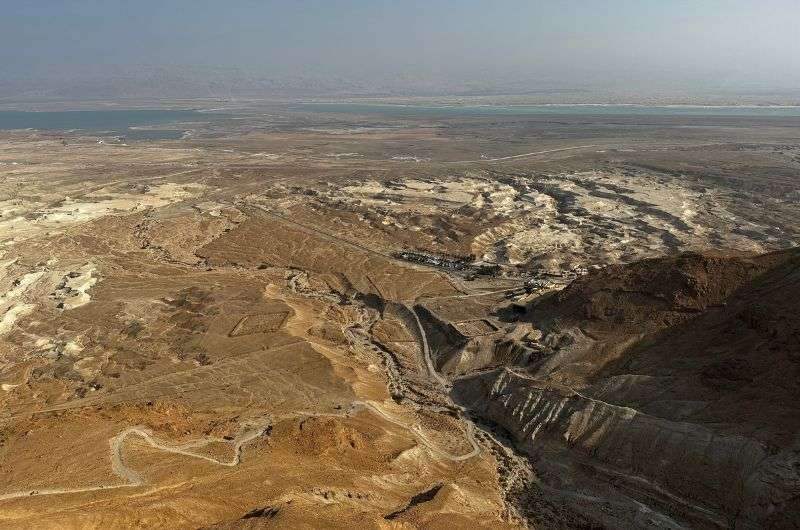
Views like this are the reason why I love hiking!
Distance from Tel Aviv: 161 km/ 100 mil, 1h 58min min drive
Time spent there: 4 hours
The drive from Tel Aviv to the Masada National Park is short but mountainous. It should take around 1 hour and 20 minutes, but who’s counting? We nearly bagged ourselves a speeding ticket, but the cops didn't speak English and let us off the hook—phew! Heads up, the minimum fine for speeding is ILS 250 (USD 67).
Masada National Park, trust me, it's a must-visit. I didn't expect it to be this impressive, but Masada has it all: rich history, stunning views, a great hike, cable cars, and proximity to the Dead Sea.
If you're into hiking like I am, take the Serpent Path on foot. I was there in winter, so the weather was perfect for not turning into a sweaty mess. The hike takes about an hour, give or take, depending on your level of fitness (or, let's be honest, how much you've been indulging lately). The path is well-maintained. For those less hike-inclined, there's a cable car, which I used for my descent. It's quick and your knees will definitely thank you (not that I’m old or fat or anything).
Masada is a Hebrew term for a fortress. It stands on the edge of the Judean Desert. In the past, the fortress had a highly strategic location as two major trade routes passed through it—the first from Jerusalem and Ein Gedi to Edom, and the second from the center of the Judean Desert to Moab.
Masada is one of the most impressive archaeological wonders of Israel. It is also listed on the UNESCO World Heritage List. Honestly, if I were to build a palace to my own greatness, Masada would be it. The site is vast, so expect to spend a good chunk of time exploring.
King Herod the Great constructed the stronghold in the first century BCE. The complex, which included features like a pool, baths, and a synagogue, was intended to function as both an opulent palace and a military stronghold. Herod also ordered the building of an aqueduct and cistern system—quite an undertaking in the middle of a desert!
The views from the top are breathtaking. You can spot all the Roman forts that quelled the Jewish revolt—classic Rome, handling a peasant uprising with flair. And, as a European, I can't help but root for Rome in this historical conflict, despite the tragic end. If you have no idea what I’m talking about, it’s time for a little history lesson:
Israelis view Masada as a representation of Jewish tenacity and resistance. The Sicarii, a group of Jewish insurgents, held Masada during the First Jewish-Roman War (66–73 CE) and resisted the Roman army. Their decision to commit mass suicide rather than give up is remembered as a testament to Jewish bravery and a refusal to bow to injustice.
- Masada National Park Official Website
- Opening Hours: Summer 8 am–5 pm; Winter 8 am–4 pm
- Entrance Fee: ILS 31 (USD 8.3)
Tip: Buy your ticket online in advance. Masada gets busy, and you'll be glad to skip the line.
Day 5, stop 2: Kalia Beach, Dead Sea
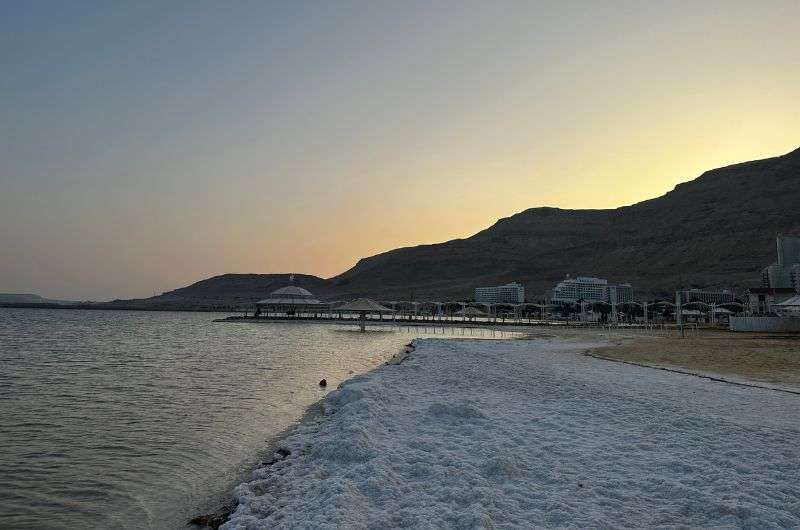
Enchanted Kalia Beach
Distance from previous stop: 61 km/ 37.9 mil, 50 min drive
Time spent there: 1.5 hours
I didn't get the hype about the Dead Sea initially. I mean, what’s so special about a super-salty lake (10x as salty as the oceans)? Turns out, a lot. It's oily, warm year-round, surrounded by old hotels, and boasts superb landscapes.
Arriving there, it feels mountainous, despite being -450 m (1 476 ft) below sea level. Fun fact: it’s the lowest point on Earth. The real showstoppers are the surrounding mountains, and they look gigantic soaring up to 1,000 m (3,281 ft) above sea level.
We chose Kalia Beach and it was a great pick. Entry costs ILS 45 (USD 12), but if you're a penny pincher, there are plenty of free beaches around, too.
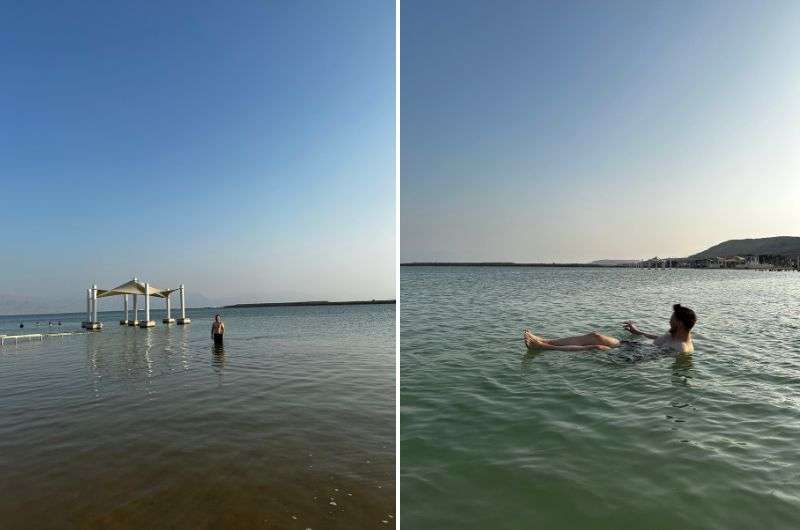
Lay back and relax - the Dead Sea will carry you and won't let you sink
What surprised me? Hot water showers on most beaches. Israel, you’re doing it right—keeping your people warm and snot-free.
- Kalia Beach Official Website
- Opening Hours: Summer 8 am–6 pm, Winter 8 am–5 pm
- Entrance fee: ILS 45 ( USD 12)
Basic facts about Dead Sea: The Dead Sea is shared by Israel and Jordan, as it lies on their border. The current area of the Dead Sea is 605 km² (324 mi²), but beware, the Dead Sea is gradually disappearing (at least a part of it). So, in a few years, this information may no longer be accurate. Interested in why? I was, so I found out. The Dead Sea is actually composed of two lakes—the northern and southern.
The southern part of the lake is utilized by both countries for mineral extraction, and there are large desalination facilities. Water is brought in from the northern part, where the water level gradually decreases. A bit awkwardly, Jordan has many hotels built precisely in the northern part, where the water is gradually diminishing.
Even though the lake is ultra-mega salty (33.7% salinity—compare to 3.5% salinity of the oceans!), it is not the saltiest lake, as many people think. Saltier lakes can be found in Antarctica, Africa, and Asia.
Fun facts about Dead Sea: The Dead Sea, thanks to its beneficial therapeutic effects, has been known for thousands of years and essentially functions as the oldest spa in the world. But everything in moderation. Bathe for a maximum of 15 minutes at a time, then rinse off with fresh water, because all that salt will irritate your skin. Also, be careful not to get water into your eyes—no need for explanations there.
When you taste the water from the Dead Sea, you will probably be surprised that it tastes more bitter than salty. The reason is that the most abundant salt present is magnesium chloride (52%).
Day 5, stop 3: Ein Bokek
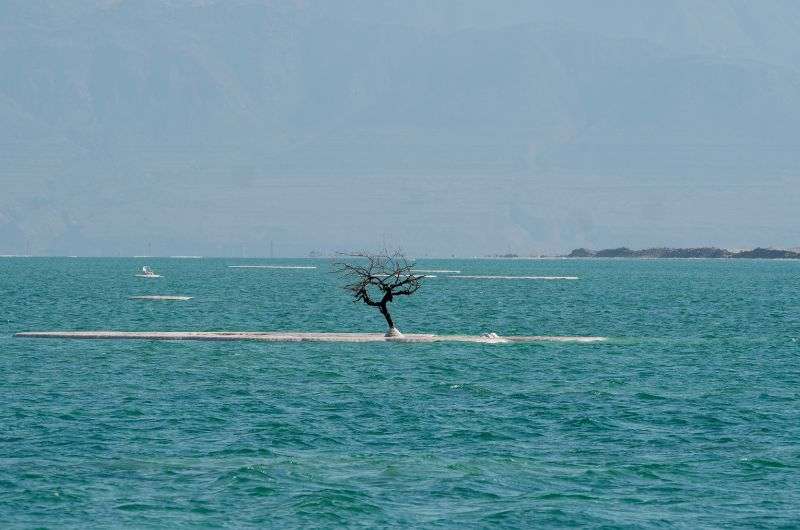
This is the tiny salt island close to the Ein Bokek beach
Distance from previous stop: 16.7 km/ 10.3 mil, 14 min drive
Time spent there: 1.5 hours
Ein Bokek is a tourist resort south of Masada, home to the "nicest" Dead Sea beach. Personally, I still vote for Kalia Beach as the top spot. It's prettier and way less crowded. But since you're nearby, why not check out Ein Bokek? Especially if you haven't seen Turkey's Pamukkale, you'll be wowed here. The water evaporation leads to a salt saturation, creating salt ponds similar to Pamukkale's limestone pools.
If you fancy a float—the closest thing to swimming in the Dead Sea—there's a tiny salt island about 500 m (1 640 ft) off the beach. It's a small patch that fits about 15 people but as a natural phenomenon, it's pretty cool. After my Masada hike, I was beat, so I stuck close to the beach.
From Ein Bokek, head back to Tel Aviv, where you'll return the car and get ready for tomorrow's train adventure.
Day 6 of Israel itinerary: Jerusalem
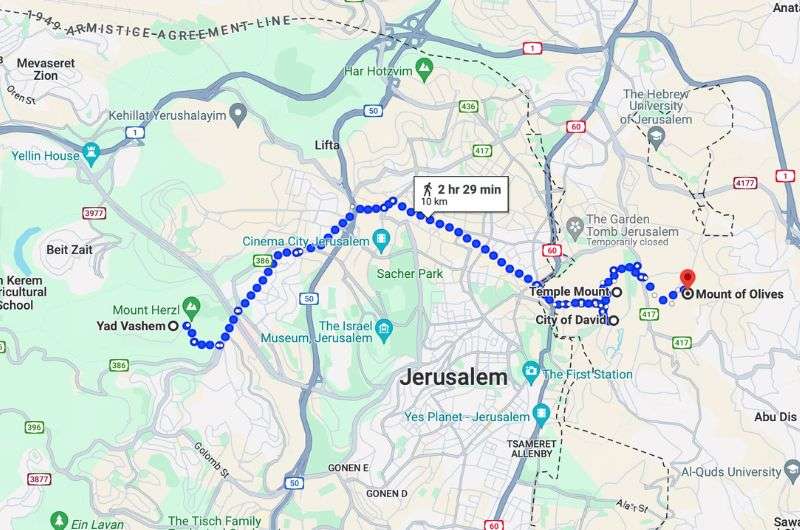
Discovering the best places in Jerusalem
Main sites visited on day 6: Yad Vashem, City of David, Temple Mount, Mount of Olives
Restaurant tips: Pergamon | Falafel Uzi | The Culinary Workshop
Hotel recommendations: Leonardo Hotel | Prima Kings Hotel
Getting from Tel Aviv to Jerusalem is a breeze with public transport, taking around an hour. I know it’s unbelievable that I didn’t drive there, but this was really the most comfortable way to get around this time. Ditch your rental car and hop on a train! Yes, the time to return the car is now. Driving in Jerusalem, in my opinion, is nonsense. Everything is within reasonable walking distance, or you can use a taxi.
I recommend staying in the city center, defined by the triangle of Jaffa, Ben Yehuda, and King George streets. Many city attractions, including the Old City, are within walking distance from this area, with other interesting spots easily accessible by public transport.
Given Jerusalem's size and history, you could easily spend a week there, but two days should suffice to see the most important sights, museums aside.
The best part? Most sights in Jerusalem have free entry. Israel, you've earned my kudos for this one.
Day 6/10 stop 1: Yad Vashem
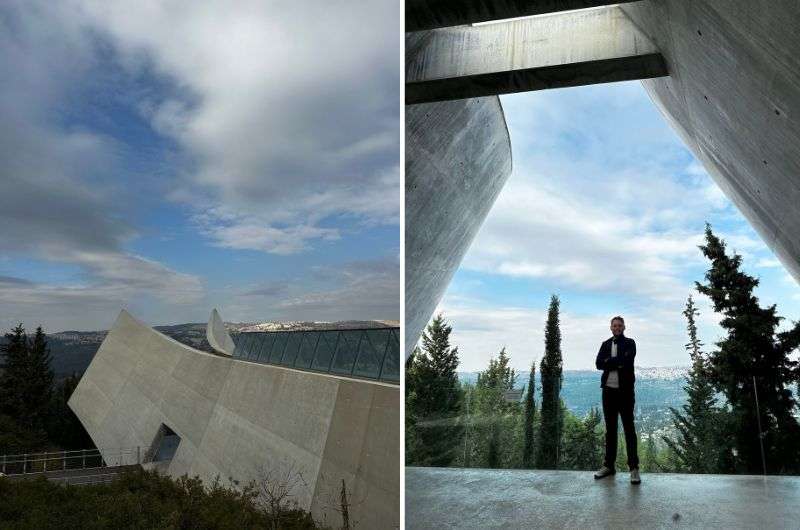
The unforgettable experience of Yad Vashem Museum
Distance from Tel Aviv: 65 km/40.4 mi, 1 hour
Time spent here: 3–4 hours (if you want to dive deep into the layers of history)
Yad Vashem is a bit off the beaten path, so you've got two choices: either get up early and hike it or, like us, grab a taxi.
Describing Yad Vashem is a tough gig; it’s both a heart-wrenching and strangely beautiful experience. Before visiting, I knew its significance and braced myself for the impact. But nothing could prepare me for the emotional whirlwind that swept me through the harrowing yet heroic tales of human resilience and suffering. Trust me, it's not just one of Jerusalem's top spots, or even Israel's for that matter. It's an experience that sticks with you, haunting and unforgettable.
You should plan to spend at least three hours at Yad Vashem in order to fully comprehend and appreciate its significance. You will delve deeply into historical layers in an attempt to comprehend the causes of antisemitism's birth and rise as a scapegoat for the ignorance and destitution of people in the past. Be ready for the eerie sights of ghettos and concentration camps, especially the highly charged Children's Memorial, which honors the young lives lost during those terrible times.
Although I think of myself as a fairly emotionless person, Yad Vashem's stories are told with a compelling and unmistakable humanity. I was on the verge of tears because of this incredible experience.
A quick tip before you go: book a time slot online. Admission is free, but this place is buzzing with visitors even in the off-season, so plan ahead.
- Yad Vashem official website
- Google Maps link
- Open Sunday to Thursday 9 am–4 pm and Friday 8:30 am–2 pm
- Free entry
Day 6, stop 1: Bethlehem
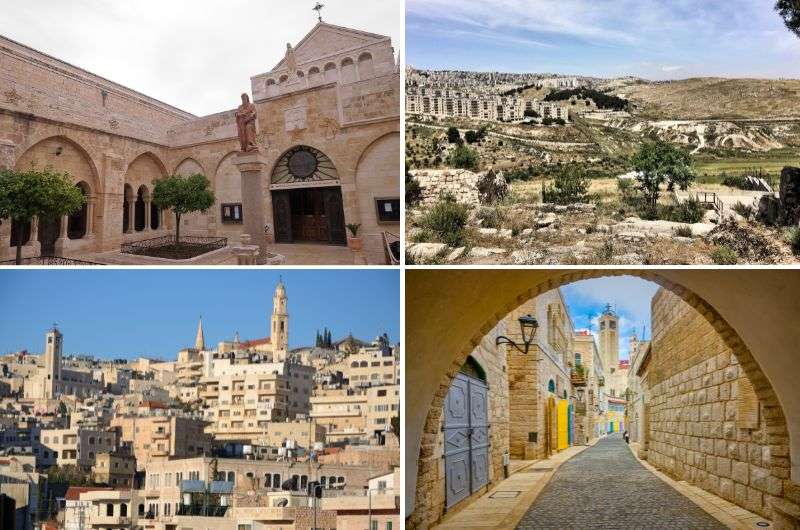
This is the city where Jesus was born
Distance from hotel: 16 km/ 10 mil, 30 min by car
Time spent there: 2 hours
Start your historical and biblical journey through Jerusalem with a morning trip to Bethlehem. Wake up early to beat the heat and the tourist crowds. Though it's a bit further and not exactly part of Jerusalem, a taxi will comfortably get you there in under an hour.
Bethlehem needs no special introduction. The story of baby Jesus, getting freebies like a true Jew, is well-known. Interestingly, in the Czech Republic, kids are told that little Jesus brings gifts on Christmas Eve, which doesn't quite align with Jewish traditions. Being the birthplace of Jesus, Bethlehem has become a Mecca for Christians worldwide.
In Bethlehem, visit the Church of the Nativity, the site of Jesus' birth. You'll find epic mosaics and feel the Holy Spirit from every corner. Brace yourself for crowds of both faithful believers and curious tourists.
Day 6, stop 2: City of David
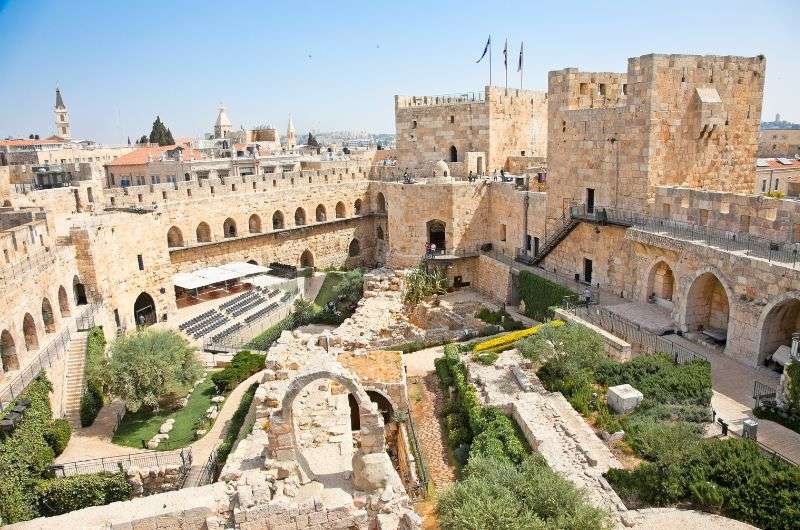
The ancient David’s City in Jerusalem
Distance from previous stop: 7.4 km/ 4.6 mil, 23 min by taxi
Time spent there: 2.5 hours
Next on our Israel trip itinerary is a dive back into Jerusalem's history with a visit to the City of David. This archeological gem is a stone’s throw away from Bethlehem—just wrestle your way through the faithful crowds, grab a cab, and off you go. If you're a sucker for history like I am, this place is your Disneyland. Trust me, you'll find history oozing out of every crevice here, from majestic palace ruins to ancient houses that have seen better days.
For touring the City of David, ditch the sneakers and opt for sandals or water shoes. Only part of the archaeological finds are above ground. To fully immerse yourself, you'll be heading underground, and yes, that means getting a bit wet. Expect to wade knee-deep in places, so, unless you like wading knee-deep in mystery water with your favorite jeans on, stick to shorts.
Perched atop Ohel hill, the City of David isn't just about old rocks and surprise aqua adventures; it also offers a killer panoramic view. After soaking in history (and a bit of water), you'll get to soak in some breathtaking views too. If ancient ruins and a forced swim aren't your thing, these views might just make up for it.
- City of David official website
- Opening hours: Sunday to Thursday 8 am–5 pm and Friday 8 pm–2 pm
- Tickets cost NIS 28 (USD 7.50)
Day 6, stop 3: Temple Mount
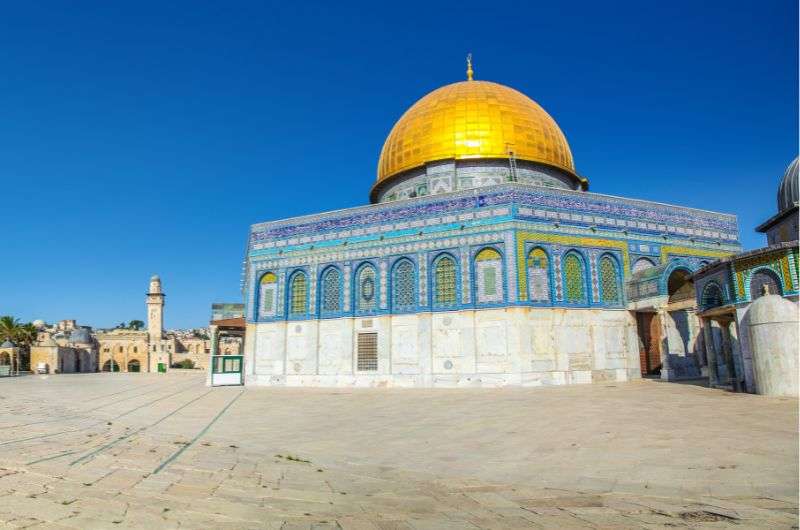
The majestic Temple Mount
Distance from previous stop: 0.6 km/ 0.37 mil, 10 min
Time spent there: 1 hour
Time to emerge from the underground and scale new heights. The hike up to Temple Mount is a bit of a leg-stretcher, but nothing you can't handle. At the top, you're greeted by a building with a fancy round golden roof. Now, if you're a non-believer like me, you'll have to appreciate it from the outside—it's mostly a Muslim-only entry zone. The limited visiting hours for non-Muslims make it clear that while they say everyone is welcome, they might mean it with a disclaimer of "but not too much."
Temple Mount in a nutshell: Jews claim it as the holiest of holy sites, Christians mark it as the place where baby Jesus made his grand entrance into God's presence, and Muslims recognize it as the celestial launching pad for Prophet Muhammad's heavenly escapade. Talk about a crowded space! But surely it’s amazing and so so cool for everyone who visits? Nah.
It's an extremely significant location from a religious standpoint, but it's also overhyped in my opinion. Don't get me wrong; from a distance especially, it does have some visual appeal. Its striking blue color makes for an unquestionably cool sight, especially when viewed from the picturesque Mount of Olives.
If religious buildings are your thing, great. If you're more about excellent views, even better. And if you happen to be Muslim, well, I guess it’s like hitting the jackpot. I settled for the awesome views option and left pretty contented.
- Open Sunday to Thursday 7:30 am–11 am and 1:30 pm–2:30 pm
Day 6, stop 4: Mount of Olives and Church of Mary Magdalene
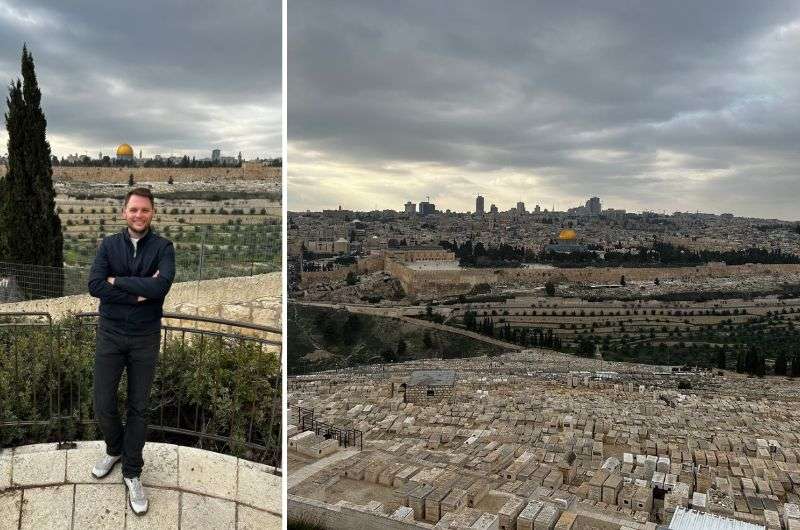
The best view of the whole Jerusalem is from the Mount of Olives!
Distance from previous stop: 1.9 km/ 1.18 mil, 33 min
Time spent there: 2 hours
Despite what the name might suggest, don't expect to pick thousands of olives at Mount of Olives and save on souvenirs for the folks back home (I mean you could, but you shouldn’t). And if you're an olive hater, beware, this place might just convert you. But let's get real, you won’t find any olive picking here, unless you brought them in your snack pack. What you will find is a hike that'll hit you twice—first physically, then with its stunning views.
Time to ditch the wet sandals and lace up some sturdy shoes. You're about to tackle a hill that stands tall at 818 m(2,683 ft)—sweaty business, especially if you're more of a couch potato. The 40-minute hike is worth every huff and puff for the breathtaking view of the Old City at the top—arguably the best vista you can snag in Jerusalem.
What else does Mount of Olives offer besides killer views? Loads of history. It's a pilgrimage site for both Jews and Christians, mentioned in both the New and Old Testaments. There's even a Jewish cemetery up there, so if wandering amongst graves is your thing, you're in luck. If you're not into tombs, don't fret; the area is dotted with plenty of monuments, including the Church of Mary Magdalene.
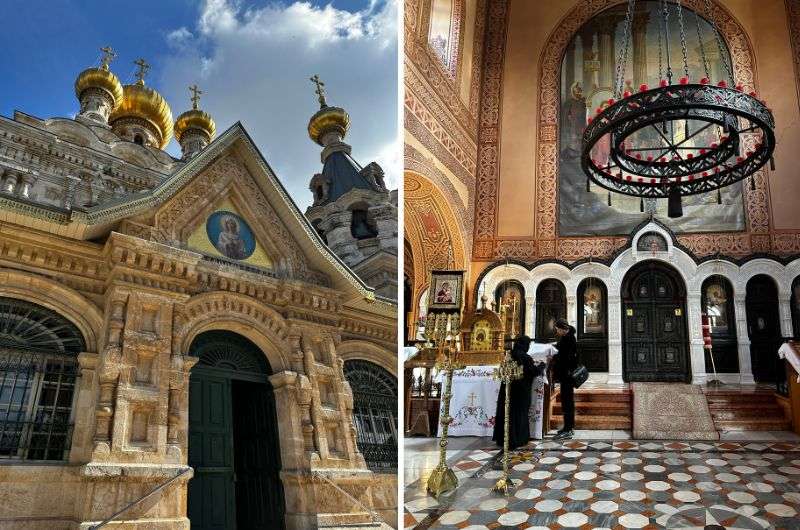
The Church of Mary Magdalene
Remember the Bible story where a woman chats with resurrected Jesus after his crucifixion? That was Mary Magdalene. This tale draws believers like a magnet, so brace yourself for a tourist swim, much like Bethlehem. Check out the inside on Tuesdays and Thursdays between 10 am and 12 pm. Any other time, it's closed to the public, so standing in that line is definitely worth it if you’re there at the right time.
Now, off for some grub and a well-deserved rest. We hit up Falafel Uzi, home to the world's best falafel and super-friendly owners. For sleep, we chose the Leonardo Hotel with beds so heavenly, you'll forget all about the day's leg workout.
Day 7 of Israel itinerary: Jerusalem
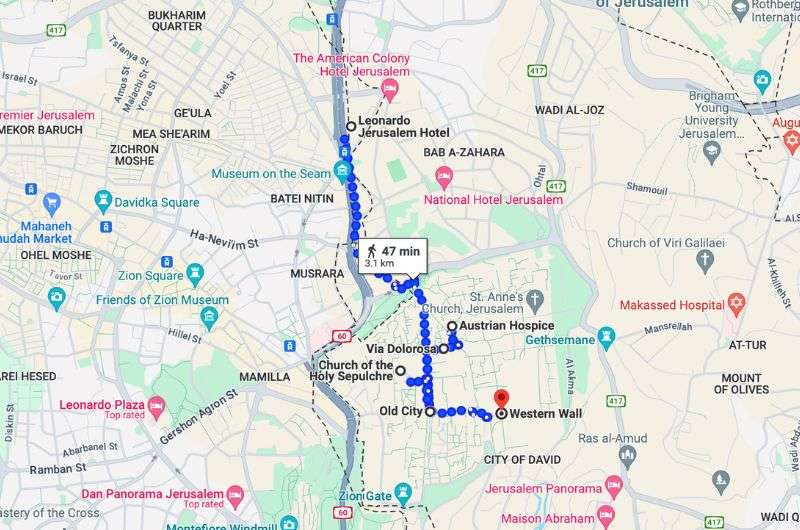
Discovering the best places in Jerusalem vol. 2
Main sites visited on day 7: Old Town, Via Dolorosa, Austrian Hospice, Church of Holy Sepulchre and Western Wall
Restaurant tips: Pergamon | Falafel Uzi | The Culinary Workshop
Hotel recommendations: Leonardo Hotel | Prima Kings Hotel | The Inbal Jerusalem
Further reading: Three-day itinerary in Jerusalem | 14 Best Places in Israel
The agenda for day 7 hinges on your flight time. Remember, the journey from Jerusalem's center to the airport is a quick 30-minute zip, but you need to be at the airport 2 hours before departure. So, plan accordingly!
Day 7, stop 1: Old Town
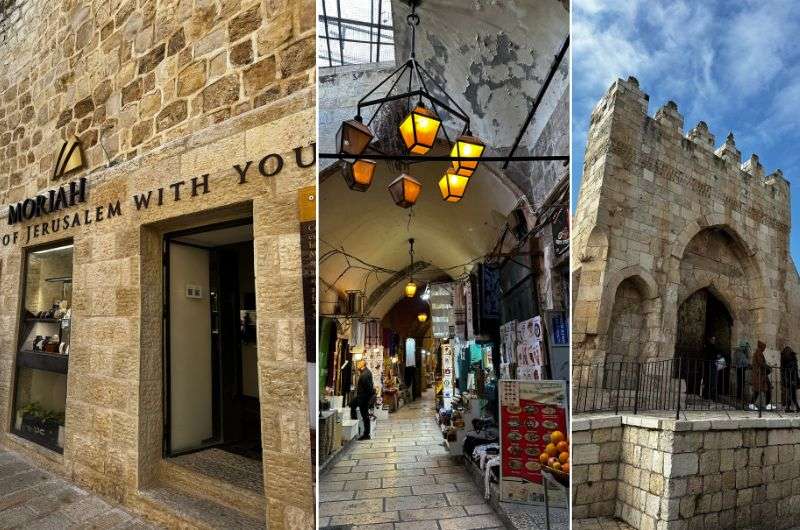
It’s time to go to the Jerusalem streets!
Distance from Leonardo Hotel: 1.6 km/ 1 mil, 23 min
Time spent there: 2 hours
Yesterday, you got the bird's-eye view of the city, gaining your bearings from up high. Now it's time to dive into the streets of Jerusalem, soak up the history and culture waiting around every corner. One thing that surprised me as I meandered through the streets was how the city feels more Arab than Jewish. The historical center is divided into four quarters, with the Arab Quarter appearing the largest and, interestingly, the most heavily guarded by armored units.
Despite the close proximity of the different quarters, you'll notice stark contrasts between them. Make sure to stroll through all of them to get the full picture. The Christian and Jewish quarters are cleaner and a tad pricier than the Arab one. In Old Town, don’t miss the Jaffa Gate—it’s an impressive sight and a great spot for photos.
My recommendation: I would definitely go on a guided tour (and you should too, if it is your first time in Jerusalem). A tour guide will give you historical context and cultural insights. Moreover, navigate through the labyrinthine streets of the Old City. Ensuring you'll not miss important sites and stories.
Day 7, stop 2: Via Dolorosa
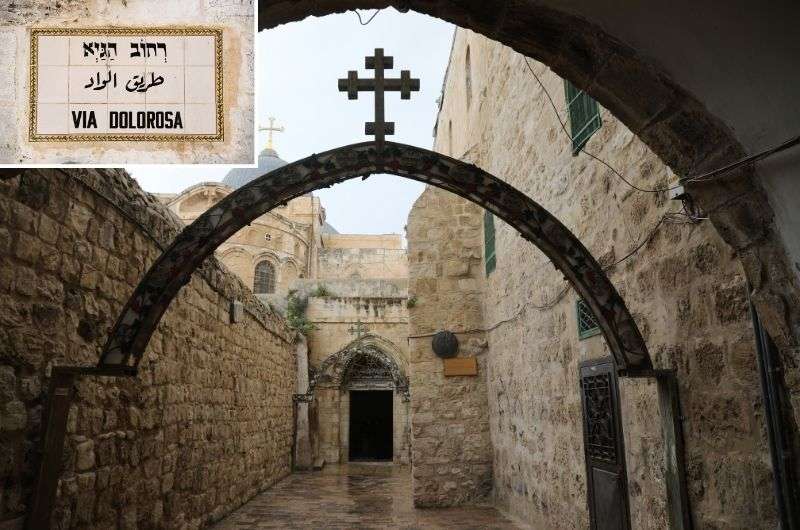
The way Jesus carried the cross
Distance from previous stop: 0.5 km/ 0.31 mil, 7min
Time spent there: 1 hours
Yesterday, you witnessed the birth of Jesus, and today, it's all about the crucifixion. Via Dolorosa is where it gets real. If you're not clued up on your history, this place might seem like a tourist trap, but this is the street where Jesus supposedly walked, dragging that huge cross, to his crucifixion. Talk about a chill down your spine.
Brace yourself for stage three of your journey through the sea of believers. The Via Dolorosa leads you along the Stations of the Cross. Fourteen stops depict the agonizing journey of Jesus with the cross, right up to the grand finale of the crucifixion. Expect locals trying to make a buck, with vendors at every stop hawking overpriced souvenirs and guides eager to sell their city expertise. But once you look past the crowds, the place has its own magical vibe.
Day 7, stop 3: Austrian Hospice
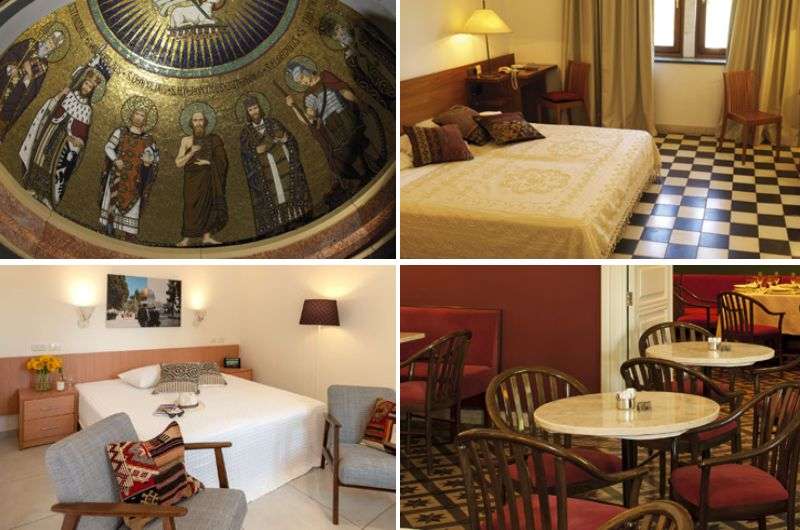
Distance from previous stop: 0 km/ 0 mil, 1 min
Time spent there: 1.5 hours
After any sporting event—and yes, navigating through crowds counts as one—you need to unwind a bit. Head over to the Austrian Hospice for some coffee and apple strudel. Don't worry, although it's a popular spot, the place is huge. Finding a quiet corner to sit down and decompress is a breeze. The hospice used to be a refuge for Austrian pilgrims traveling through the Holy Land—hence the strudel connection.
I recommend this spot not just for the dessert and the unique atmosphere it offers. The hidden gem here is the rooftop access. Climb up, and you’re rewarded with a panoramic view right at the heart of the Old City. Trust me, it's the perfect way to round off your Jerusalem adventure.
- Austrian Hospice Official Website
- Opening hours: 10 am- 10 pm
Day 7, stop 4: Church of Holy Sepulchre
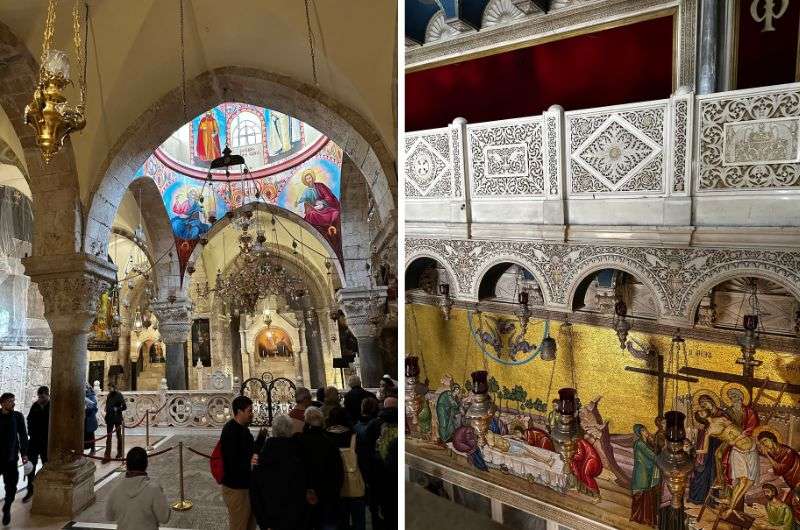
The prominent Church of Holy Sepulchre
Distance from previous stop: 0.45 km/ 0.28 mil, 7 min
Time spent there: 1 hour
The next stop is what I'd call a 2-in-1 deal: a building of immense religious importance that also happens to be stunningly beautiful. As we've seen, the more religious significance a place has, the more tourists flock to it. The Church of the Holy Sepulchre is no exception. Time to don your metaphorical swimsuit and dive into the sea of tourists. Expect long lines of people hoping Jesus decides to pop back to life and have a chat. Good luck with that.
If you're thinking of using your precious holiday time for an Israeli vacation during religious festivals, I'd advise skipping Easter and Christmas—it must be an absolute zoo there.
Here's a fun tidbit about this place: it's so significant that six Christian denominations claimed it at once. So, back in the 12th century, they came up with the Status Quo agreement. The church got divided into six parts, and each denomination takes care of its own section. This system's been smooth sailing for nine centuries, and for that, hats off to Israel.
And another fun fact: Despite its Christian significance, the keys to the church are actually owned by a Muslim family. Talk about interfaith cooperation!
- Church of Holy Sepulchre offical website
- Opening hours: 5 am—8 pm (winter 7 pm)
Day 7, stop 5: Western Wall
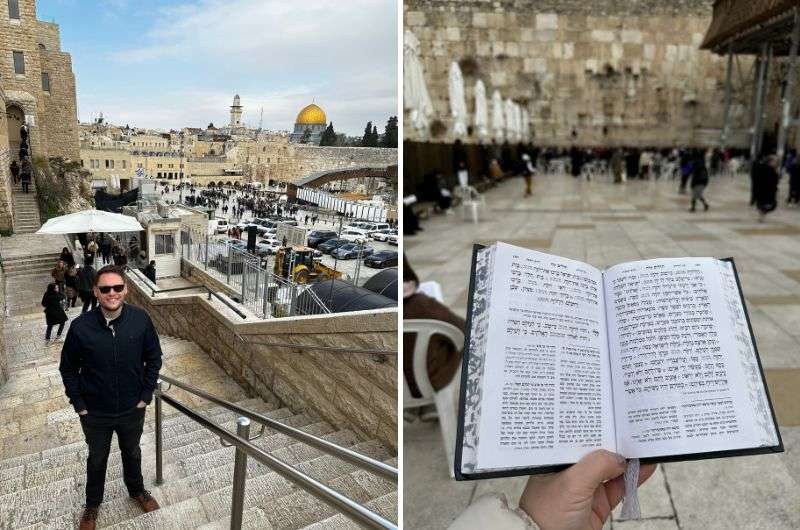
The Western Wall is definitely not to be missed
Distance from previous stop: 0.55 km/ 0.33 mil, 9 min
Time spent there: 1.5 hours
As the day winds down and prayer time kicks in, make your last stop at the Western Wall. Keep me out of the prayer circle, but for the Jewish people, this is the ultimate place of prayer in Israel and a tourist hotspot to boot. I came to the Western Wall with high expectations, and boy, did it deliver. The sense of sanctity here is tangible.
If you've read up on the Western Wall, you know it's where Jews come to pray and leave little notes with prayers or wishes in the wall's crevices. To avoid offending the local Jewish community, there are a couple of basic rules to follow. Never turn your back to the Wall—it's considered disrespectful. Instead, walk away backwards. The second rule is about gender. The Wall is split into men’s and women’s sections, so if you're traveling with your better half, it's time for a temporary split.
- Western Wall official website
- Opening hours: daily
Do you have more time? Here is the Israel itinerary for 10 days!
This is the route of your 10day Israel itinerary (see it on Google maps)
Here’s how to plan the best 10 days in Israel:
Day 1: Arrival in Tel Aviv (afternoon promenade)
Day 2: Drive to the Sea of Galilee, Tzipori NP, Mount of Beatitudes (sleep Ein Gev)
Day 3: Drive around the Sea of Galilee, Bet Shean (sleep Ein Gev)
Day 4: Drive to Rosh Hanikra, Akko (sleep Tel Aviv)
Day 5: Micpe Ramon + Avdat NP (sleep Tel Aviv)
Day 6: Haifa, Caesarea (sleep Tel Aviv)
Day 7: Dead Sea, Masada, Ein bokek oasa (sleep Tel Aviv)
Day 8: Jerusalem (sleep in Jerusalem)
Day 9: Museum day: Yad Vashem & Israel Museum
Day 10: Jerusalem, departure
Wow, you must be rolling in it to have 10 days to spend in Israel! Now, let's not get lost in the whirlwind. Here's your day-by-day breakdown. Our 'sneaky' Day 0 has now officially become Day 1. Or, you can keep Day 0 for traveling and have a full, official first day to explore Tel Aviv. Check out this 1 Day itinerary in Tel Aviv for some ideas.
But wait, there's more! I’m expanding the the 7-day version into a 10-day itinerary by adding some extra spice on Days 5 and 9. Don’t worry, you didn't think I’d leave you wandering Israel aimlessly for two days, did you? I've got a killer plan to make sure you squeeze every bit of awesomeness out of these additional days.
Day 5 of 10–day Israel itinerary: Micpe Ramon, Avdat NP
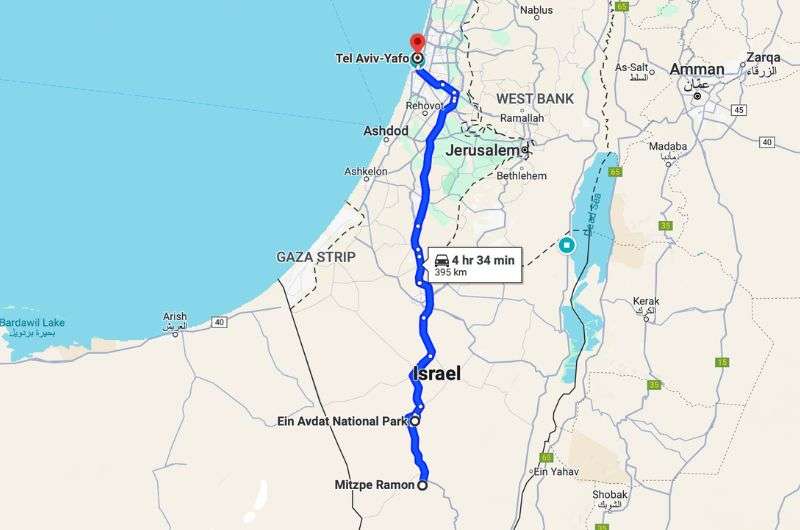
Driving from Tel Aviv to Micpe Ramon and Avdat National Park and back
Main sites visited on day 1: Avdat NP, Micpe Ramon (Maktesh Ramon)
Restaurant tips: Keeboots Café | Sumsumiya
Hotel recommendations: The Norman Tel Aviv | Hotel Saul
Further reading: The 8 Best Day Trips from Tel Aviv | 14 Best Places in Israel | 13 Must-try Israeli street food
Day 5/10, stop 1: Maktesh Ramon
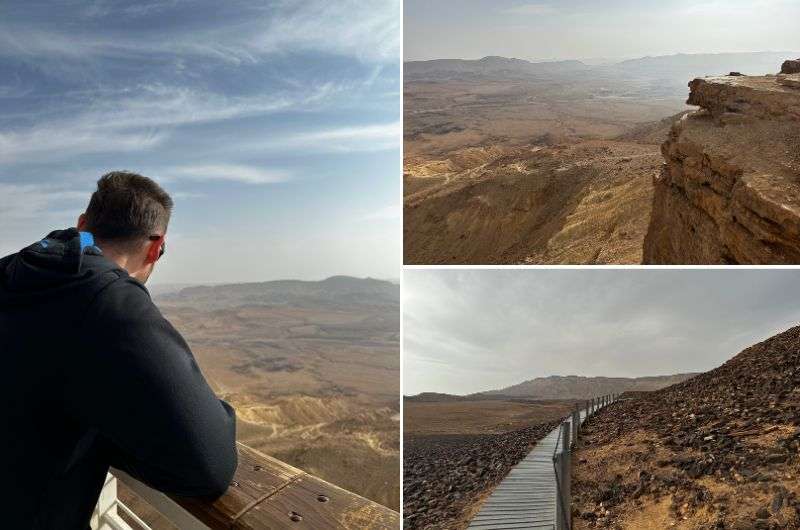
Maktersh Ramon is another great hike topped with an amazing view
Distance from Tel Aviv: 194 km/120.5 mi, 2 hours 13 min drive
Time spent here: 3 hours
Mitzpe Ramon is not just a town; it's your gateway to exploring the Ramon Crater. And hey, it's also chock-full of restaurants, making it the perfect spot to refuel. There are some great-looking options like Keebots Cafe and a bunch of street food joints. Speaking of which, do yourself a favor and check out '13 Must-try Israeli Street Foods' to know what to sample.
Makhtesh Ramon is a unique geological formation that looks like a crater but was actually created by erosion. Words don’t do it justice—you've got to see it (or at least a picture). It's like nowhere else, or is it? It gave us major Canyonlands National Park vibes from the US. After a 2-hour drive from Tel Aviv, you hit the real desert. I kind of felt cheated because I was expecting Israel's rugged dry land, but instead, I got the green Sea of Galilee and Jerusalem. But hey, this is the true Israel.
The best way to enjoy this massive canyon is from the rim near the visitor center. Surprisingly chilly, considering it's in the desert and, well, Israel. You can drive down into the canyon for a self-drive tour of about an hour, which is semi-worth it. It doesn't quite compare to the rim view, which is just outstanding.
Day 5/10 stop 2: Avdat National Park
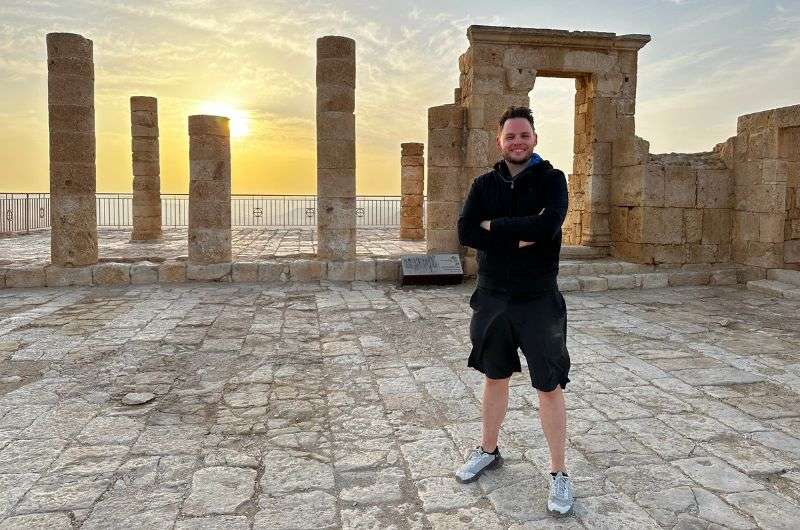
Don’t forget to stop by the Avdat National Park!
Distance from Tel Aviv: 35 km/21.7 mi, 30 min drive
Time spent here: 1–2 hours
On your way back to Tel Aviv, make sure to drop by Avdat National Park. This place isn't just about superb views and stunning Roman and Nabataean architecture—it's location, location, location. Picture this: gorgeous ruins perched over a desert viewpoint, throw in a sunset, and bam—you've got one of the most unforgettable experiences in Israel. True story.
Back in the day, this spot was a major trade and strategic hub. Founded probably around the 4th century BCE, Avdat played a pivotal role in commerce and communication between the Arabian Peninsula, Palestine, and the Byzantine Empire.
Fun fact: In 2005, Avdat made it to the UNESCO World Heritage List as part of the 'Incense Route—Desert Cities in the Negev'. It's part of a network that connected the Middle East and was crucial for spice trade in ancient times (the name kinda gives it away).
And then, it's just a breezy two-hour drive (165 km/102.5 mi) back to Tel Aviv. But you're no amateurs—you're seasoned travelers just like me, so you'll nail it! Our snooze spot remains the Crowne Plaza Tel Aviv City Center.
Day 9 of 10–day Israel itinerary: Bethlehem & Israel Museum
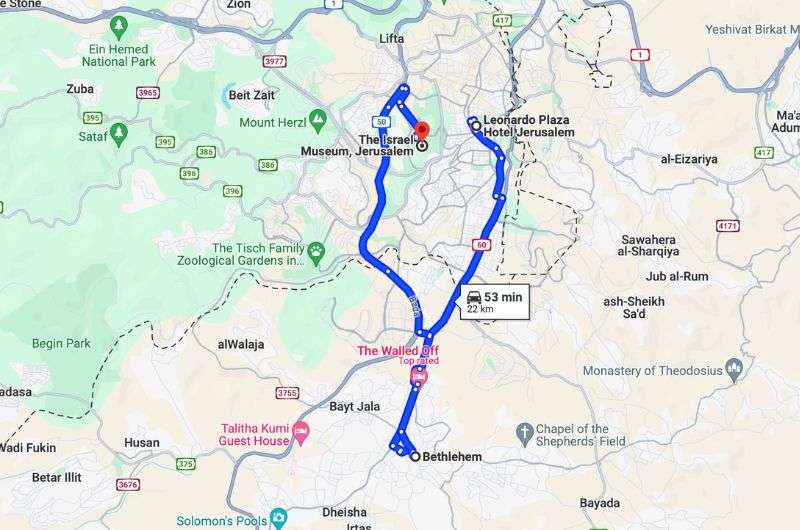
Discovering another amazing spots in Jerusalem
Main sites visited on day 1: Bethlehem, Israel Museum
Restaurant tips: Pergamon | Falafel Uzi | The Culinary Workshop
Hotel recommendations: Leonardo Hotel | Prima Kings Hotel | The Inbal Jerusalem
Further reading: Jerusalem itinerary | Sacred wonders | 26 things to know before visiting Israel
You know how I feel about museums, right? It should come as no surprise that in my extended version of this itinerary, I'm dedicating half of the day to the museum. I mean, who wouldn't want to dive deep into the breathtaking history of the 20th century? If you're not into that, I might be tempted to call you foolish—but let's not go there. Onward!
Day 9, stop 1: Bethlehem
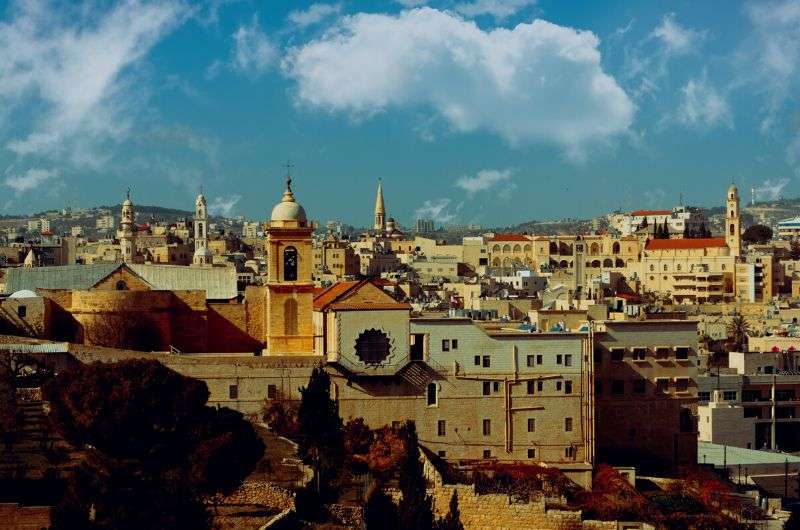
This is the city where Jesus was born
Distance from hotel: 10 km/ 6.2 mil, 25 min by taxi
Time spent there: 2 hours
Start your historical and biblical journey through Jerusalem with a morning trip to Bethlehem. Wake up early to beat the heat and the tourist crowds. Though it's a bit further and not exactly part of Jerusalem, a taxi will comfortably get you there in under an hour.
Bethlehem needs no special introduction. The story of baby Jesus, getting freebies like a true Jew, is well-known. Interestingly, in the Czech Republic, kids are told that little Jesus brings gifts on Christmas Eve, which doesn't quite align with Jewish traditions. Being the birthplace of Jesus, Bethlehem has become a Mecca for Christians worldwide.
In Bethlehem, visit the Church of the Nativity, the site of Jesus' birth. You'll find epic mosaics and feel the Holy Spirit from every corner. Brace yourself for crowds of both faithful believers and curious tourists.
Day 9/10 stop 2: The Israel Museum
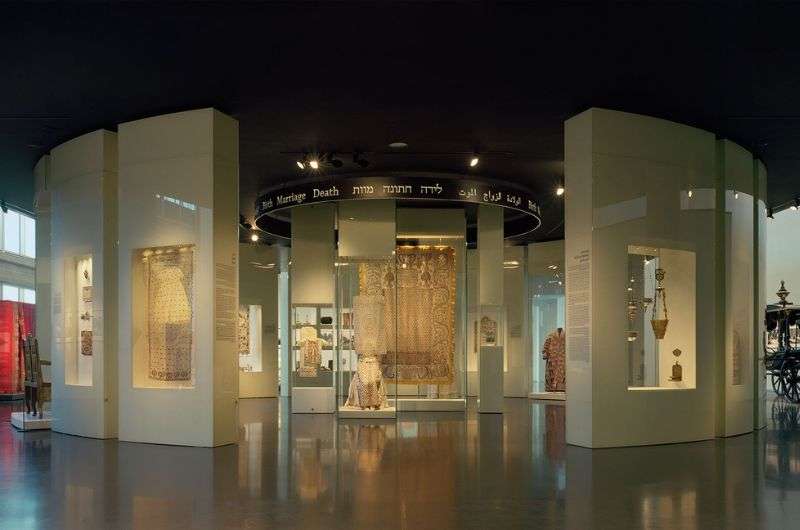
One of the exhibitions in The Israel Museum
Distance from previous stop: 22 km/13.7 miles, 53 min by taxi
Time spent here: 3–5 hours
The Israel Museum is one of the largest, and dare I say, the most jaw-dropping museums I've ever set foot in. I lasted a whole three hours, which for a museum-hopper like me, is pretty epic. I can imagine someone less hyperactive than me easily spending half a day there. Even if you're not the typical museum-goer, this place is bound to impress.
Proudly displaying over 500,000 works of art, the Israel Museum spans from ancient treasures to modern-day masterpieces. But the real showstopper is the Shrine of the Book. No, it's not the secret hideout of literary superheroes, but it does hold something equally remarkable: the famous Dead Sea Scrolls. These ancient texts, discovered about 80 years ago, include parts of the Old Testament (except the Book of Esther), and trust me, seeing them is something else.
Curious about what else caught my eye in this museum? Check out the second day of my 3-day Jerusalem itinerary for the full scoop.
- The Israel Museum official website
- Google Maps link
- Open Wednesday to Sunday 10 am–5 pm and Tuesday 4 pm–9 pm
- Tickets: ILS 54 (USD 14) and can be bought online
After feeding your soul with history and art, it's high time to feed your stomach. Where to eat? Head over to The Culinary Workshop. The staff is fantastic, and as a bonus, they're easy on the eyes (finally, I'm among my people). The food is top-notch, though a bit pricey, and they serve the absolute best burger I've ever had—which is quite the feat in Israel, where mixing meat and cheese is a no-go. They even threw in shots on the house and had excellent appetizers. Plus, it's in a great location.
FAQ 1: What’s the best time to visit Israel?
Israel is great all year round, but I'd revisit during Christmas for mild sightseeing weather. The shoulder seasons are from February to May and October/November, with some days warm enough for a swim. I'd probably skip the summer, though—it's blazing hot.
FAQ 2: Is Israel safe?
This must be the most frequent question I get asked and yes, it is very safe. Honestly, I didn't even think to look it up until everyone started asking. It's a wealthy country with a strong military presence whose main job is to keep you safe. The only slightly sketchy areas are some Arabic neighborhoods, but nothing like Mexico.
FAQ 3: Is it safe to drive in Israel?
OMG yes, it’s safe to drive in Israel as long as you can deal with the unpleasant drivers. Israel has one of the best infrastructures of all countries I have visited. Highways… highways everywhere. Israelis on the other hand aren't the best drivers, so just be patient and brace yourself for some rudeness on the roads.
FAQ 4: What about Shabbat in Israel?
Shabbat is a semi-working state. Non-Jewish businesses stay open, but public transport, some restaurants, and shops close. More traditional areas like Jerusalem follow stricter rules, but we, mere tourists, didn't encounter any extreme Shabbat observances like no lights or no access to food.
FAQ 5: Can I drink tap water in Israel?
You bet. Israel's modern and wealthy status means top-notch plumbing, so the tap water is safe to drink. Just a heads up, it might taste more chlorinated than you're used to.
This post contains affiliate links. I earn a small commission if you make bookings through my links, at no additional cost to you. This helps keep this blog free, thank you!


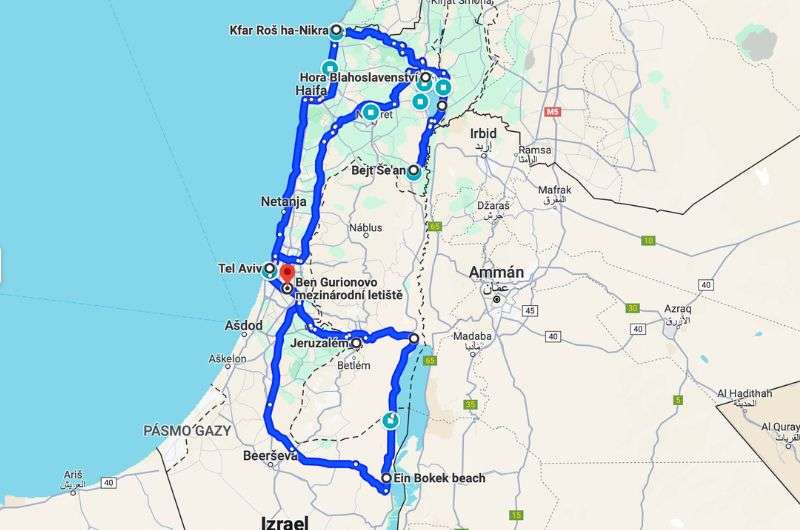
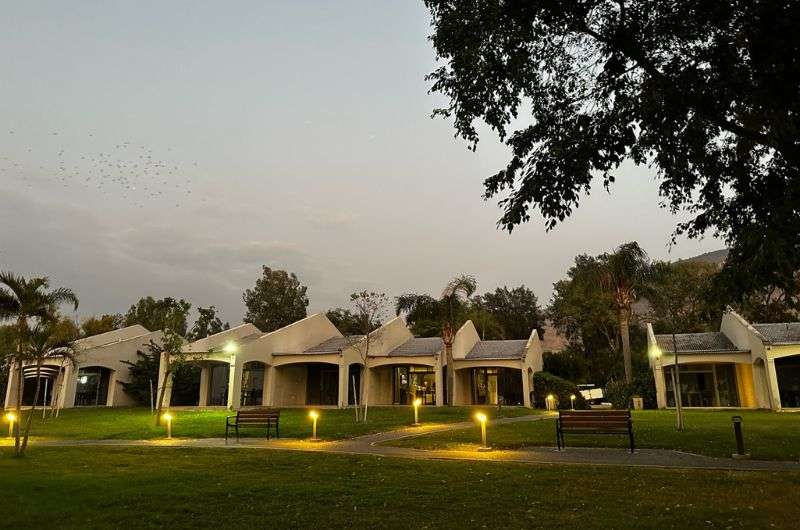
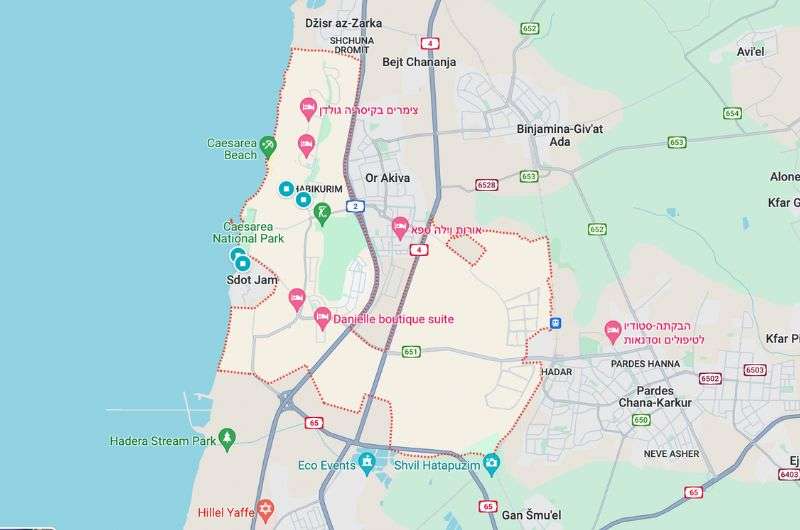
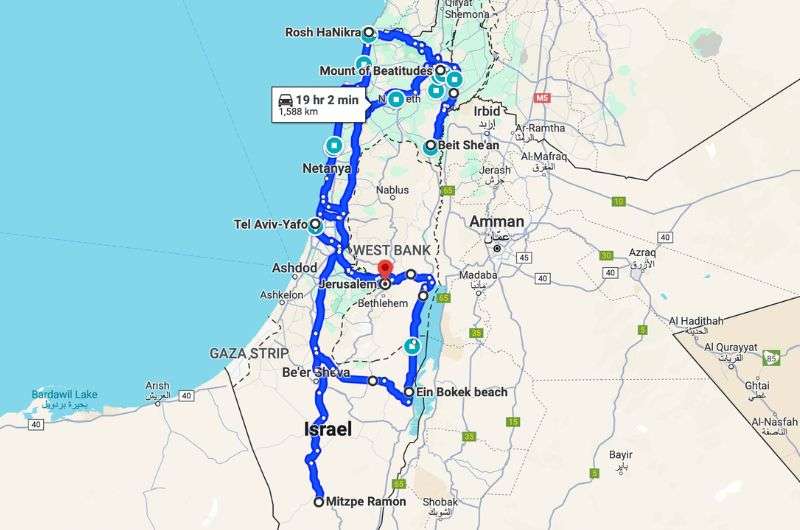
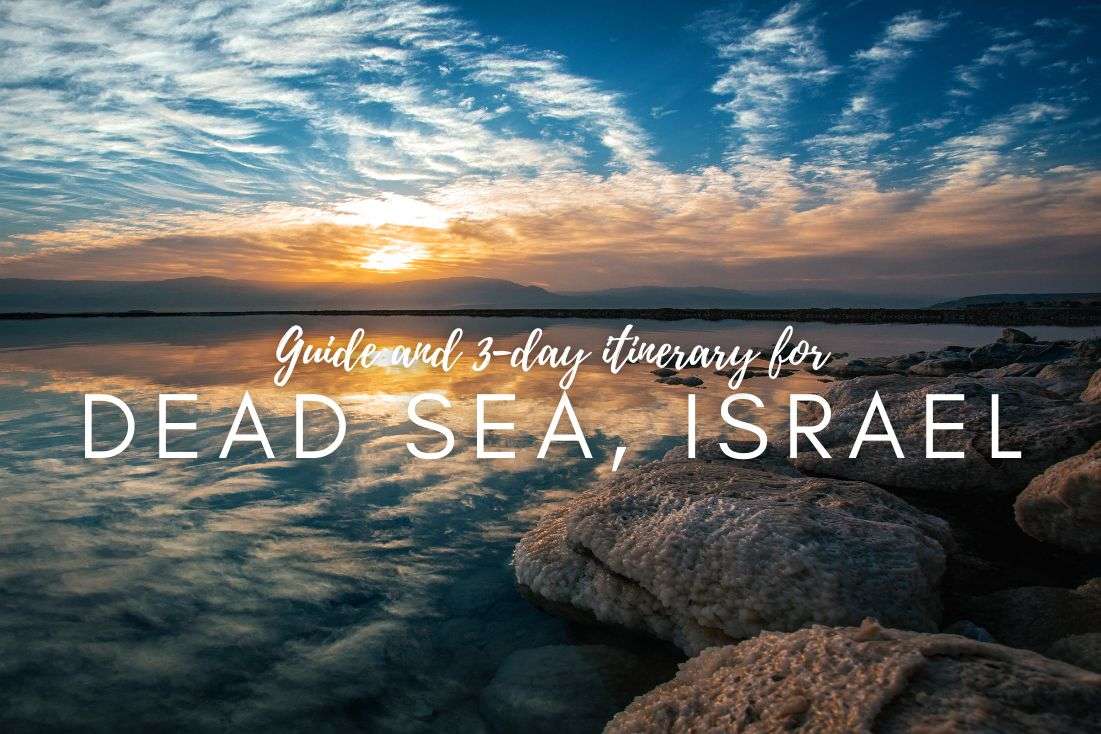
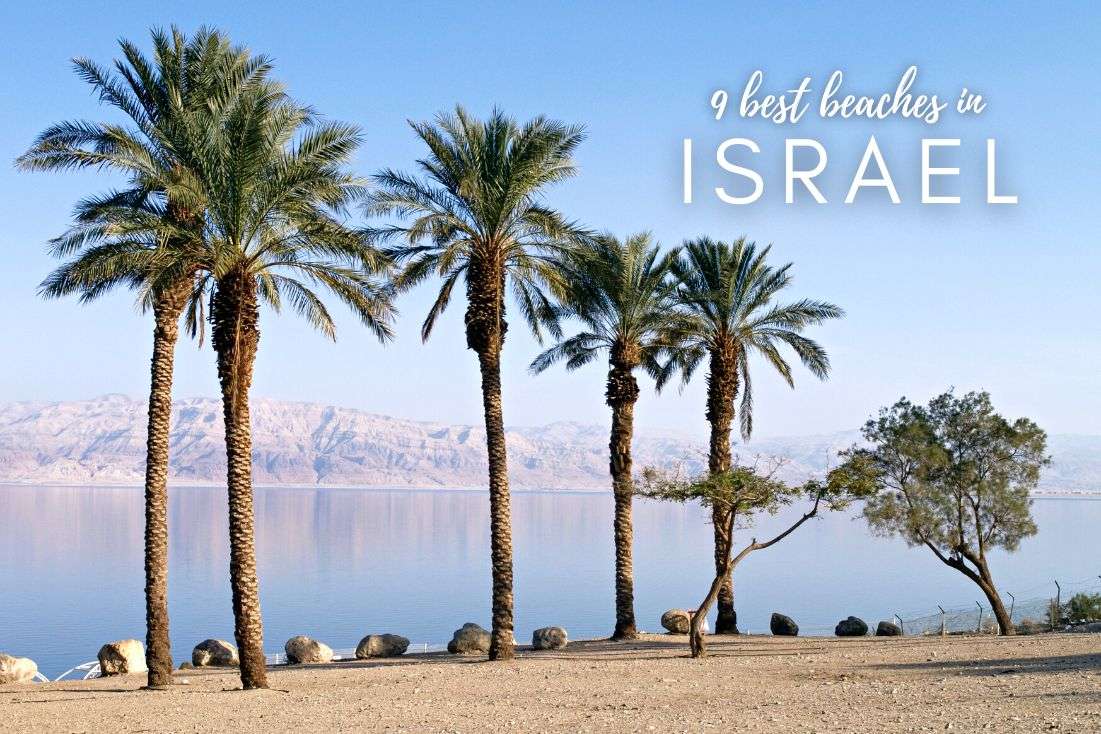
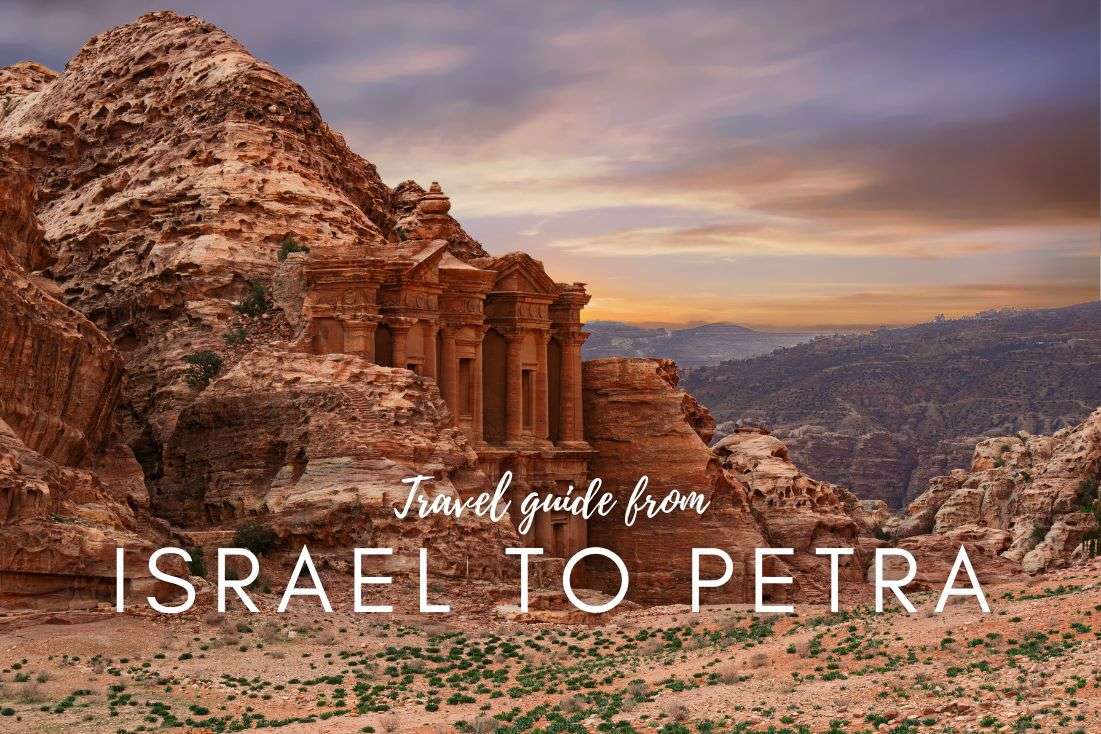





Comments | Thoughts? Give us a shout!